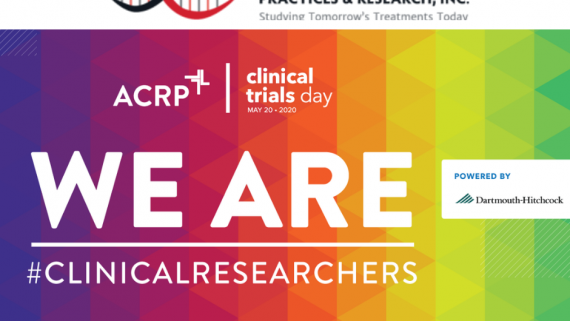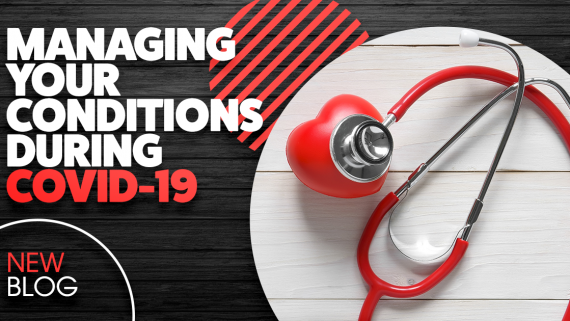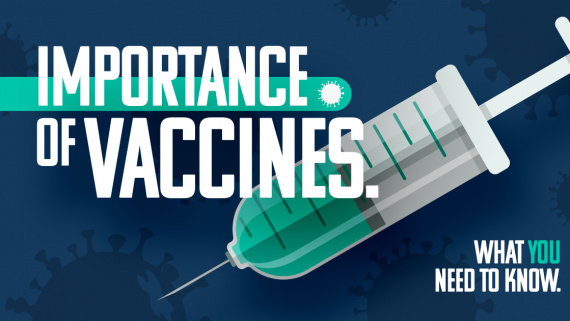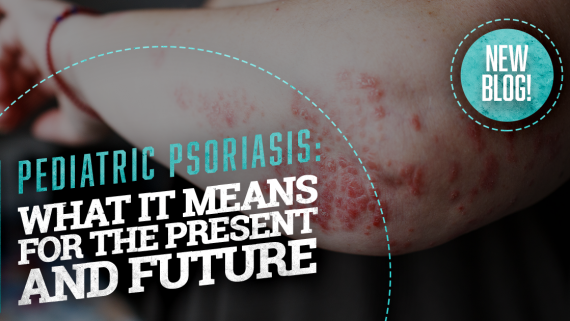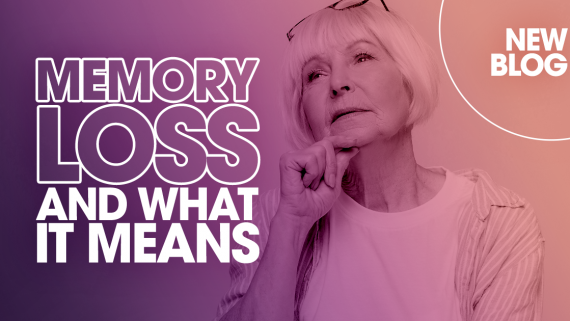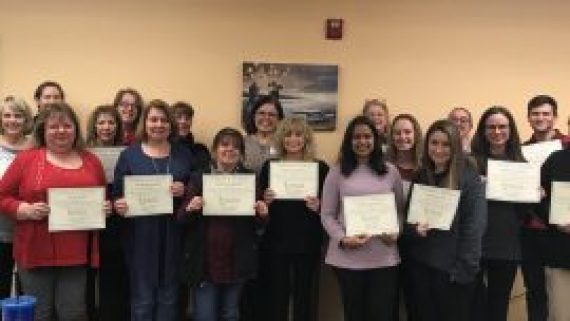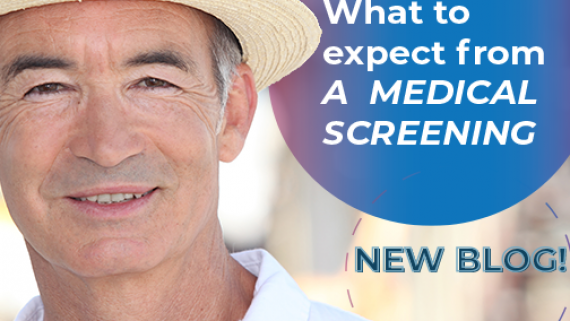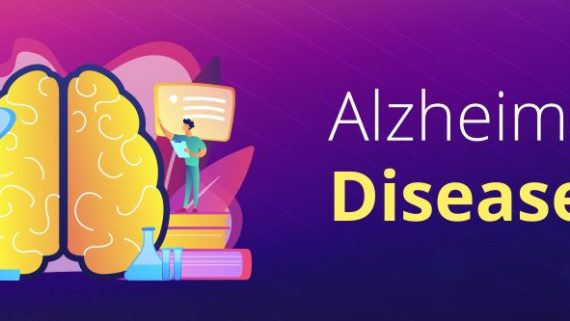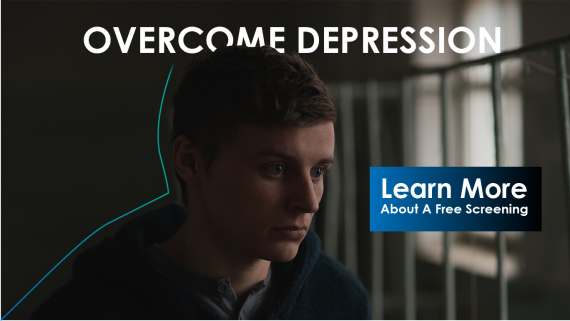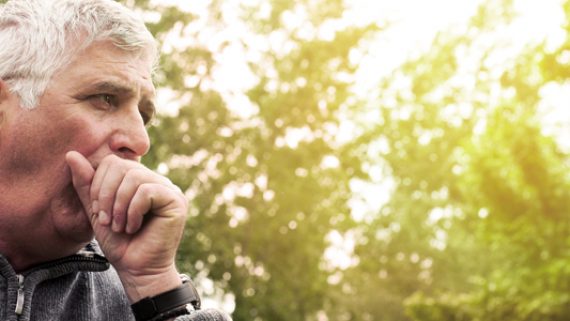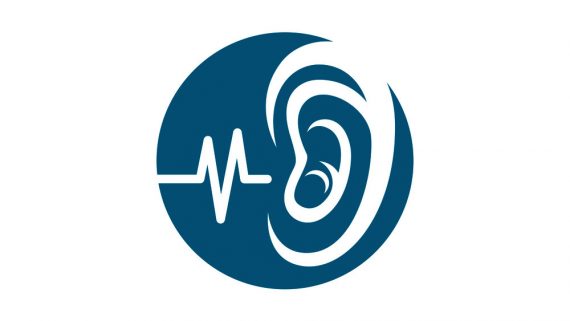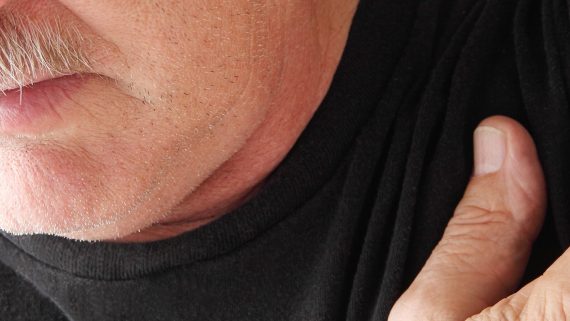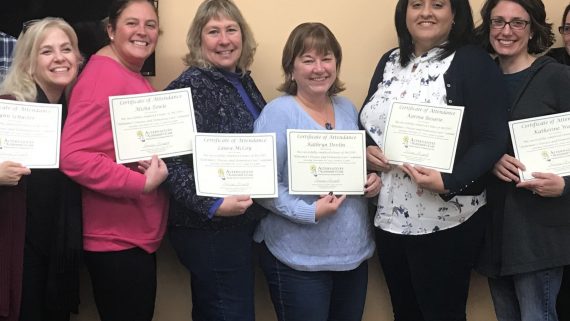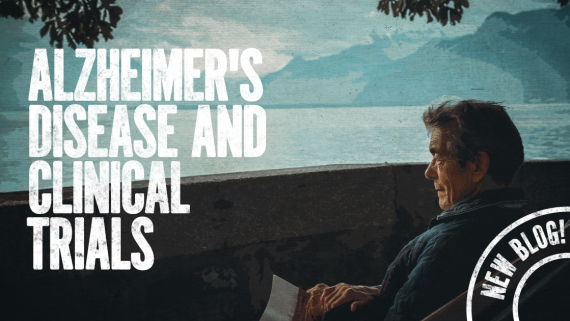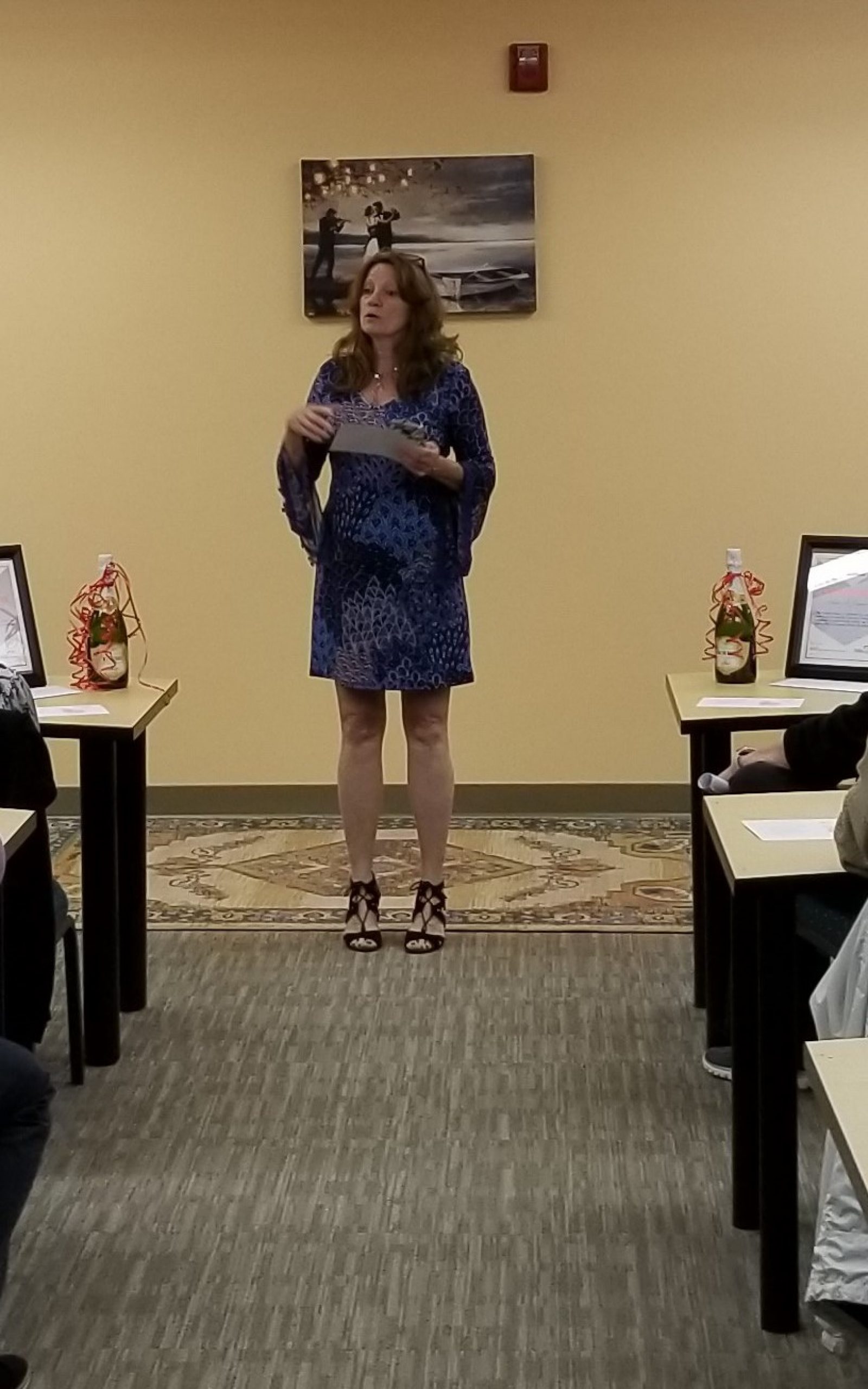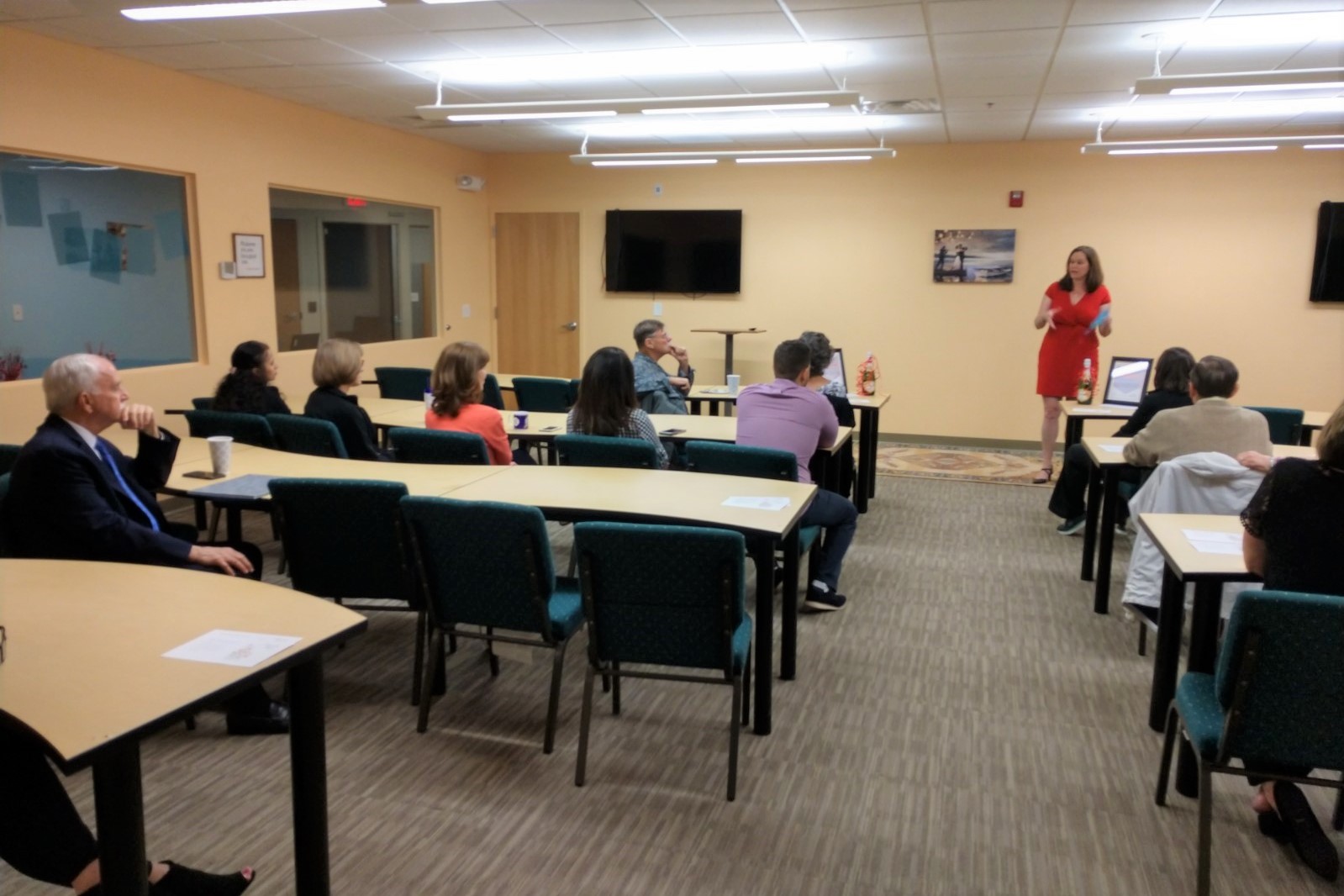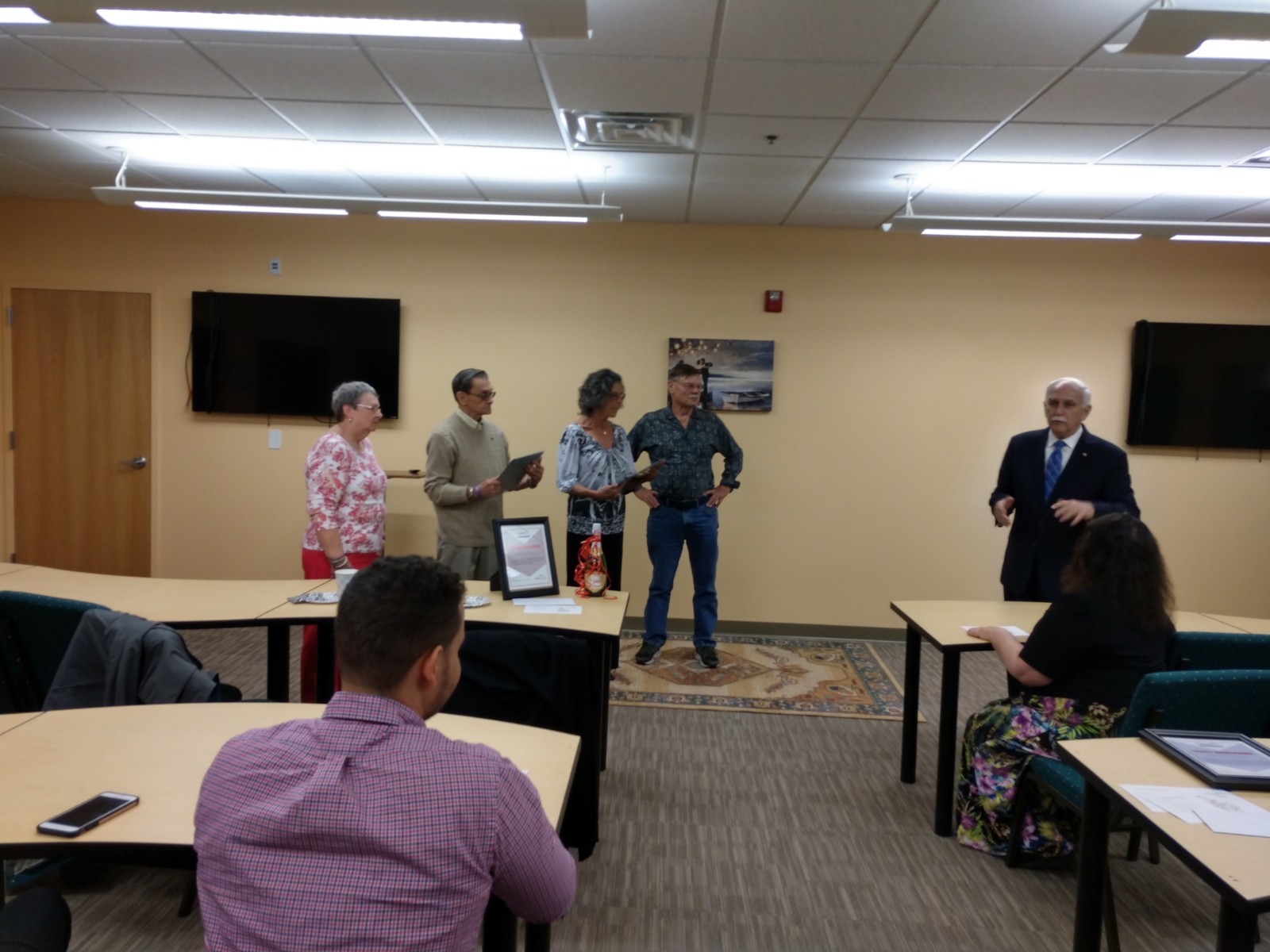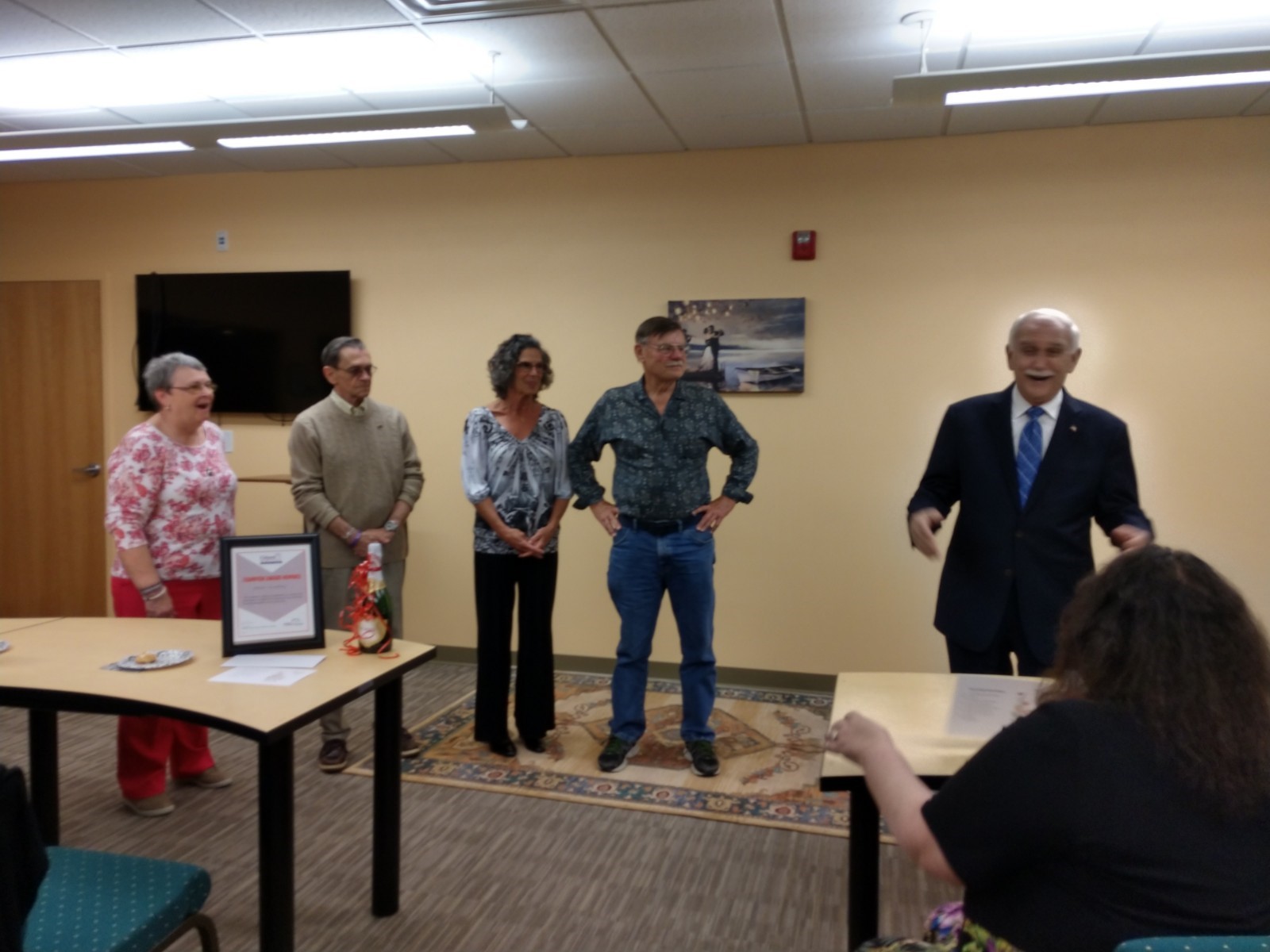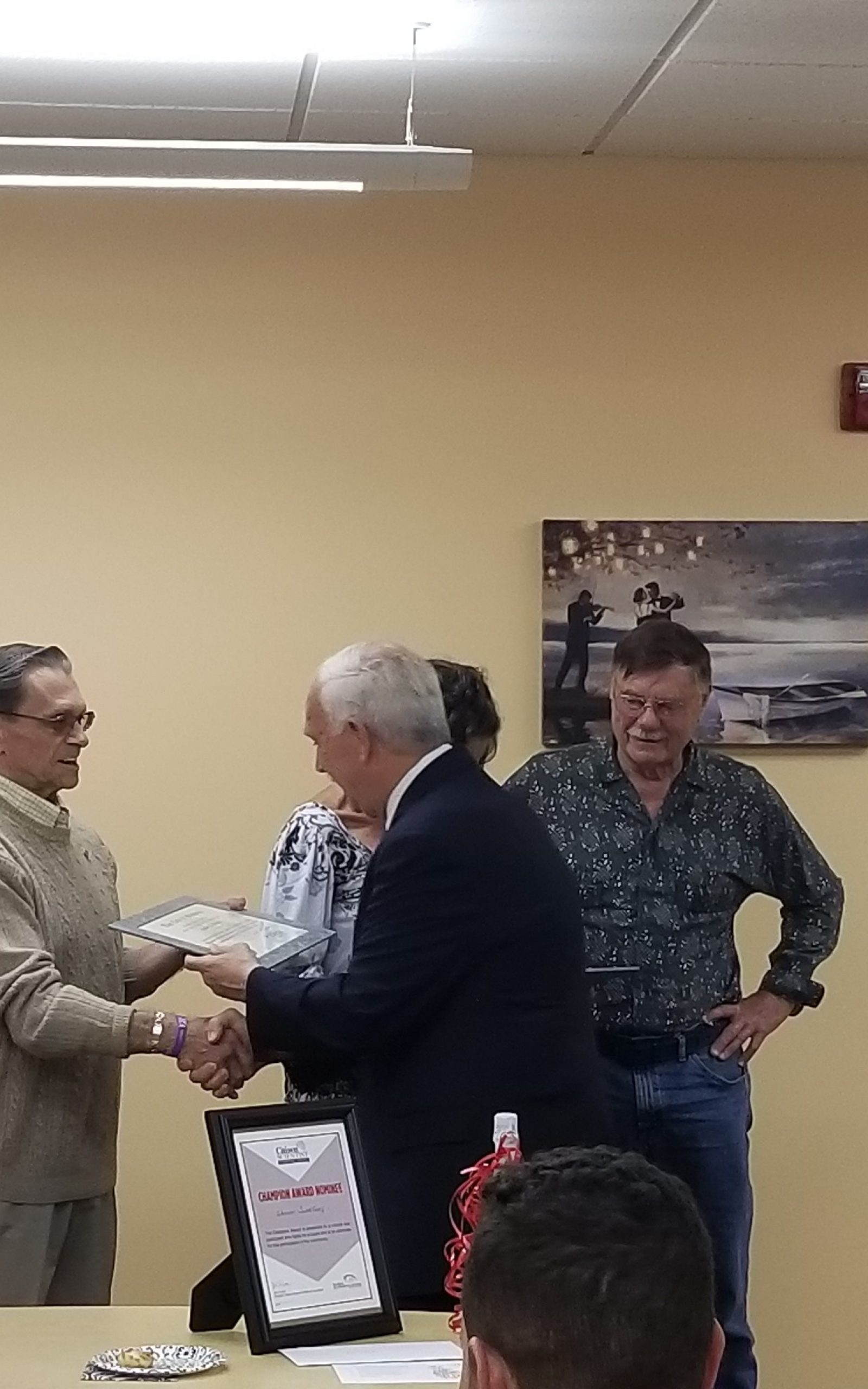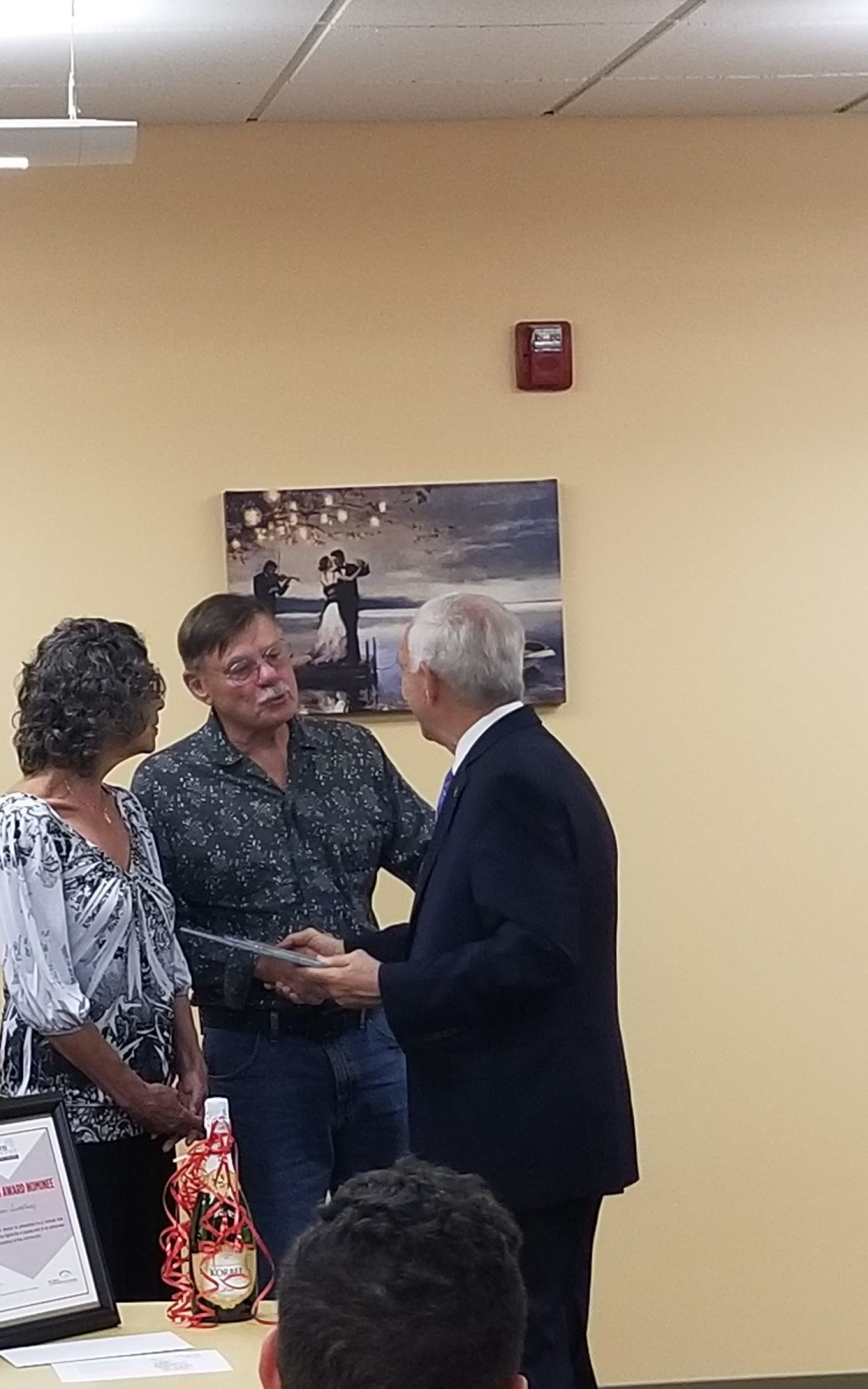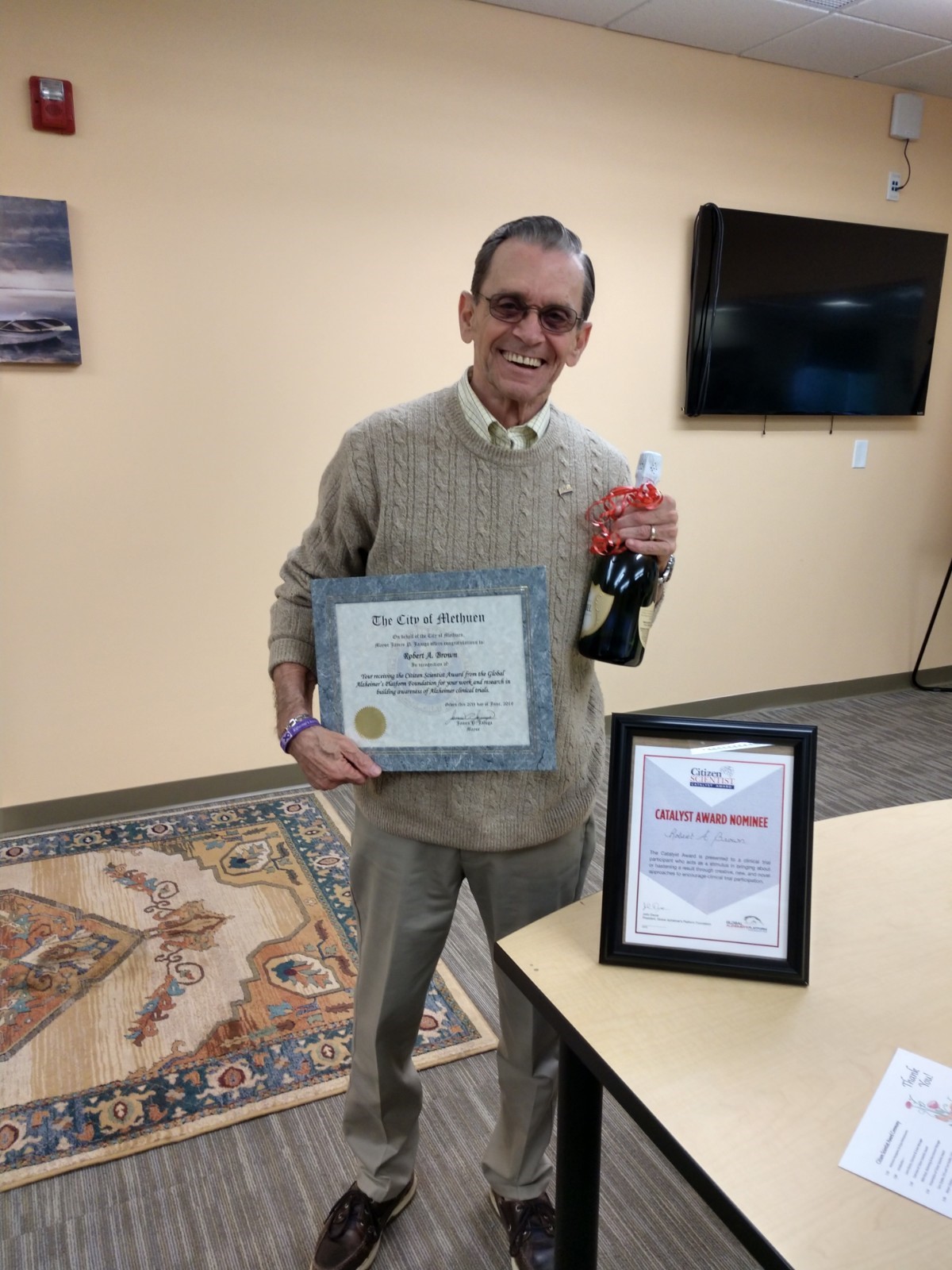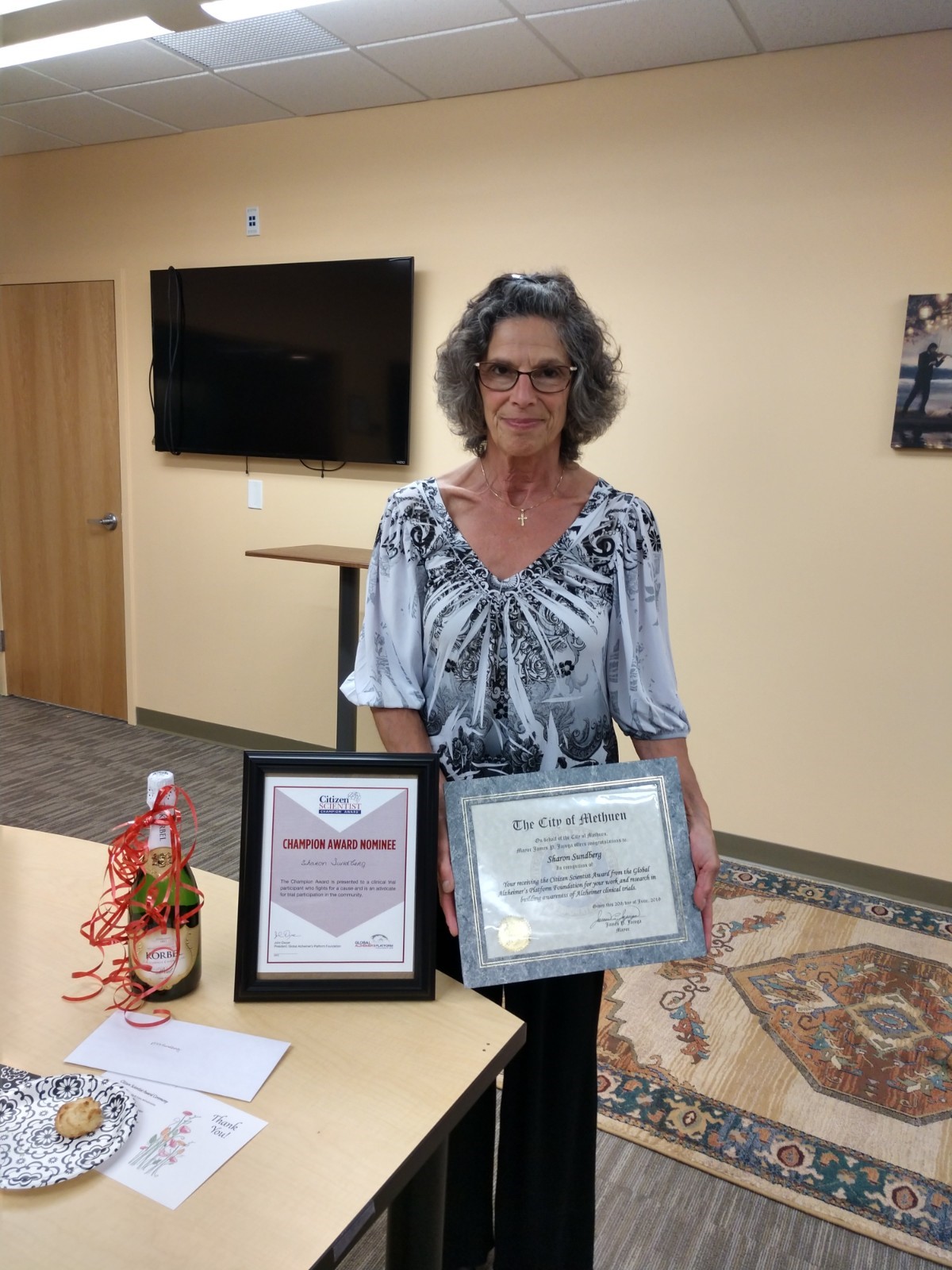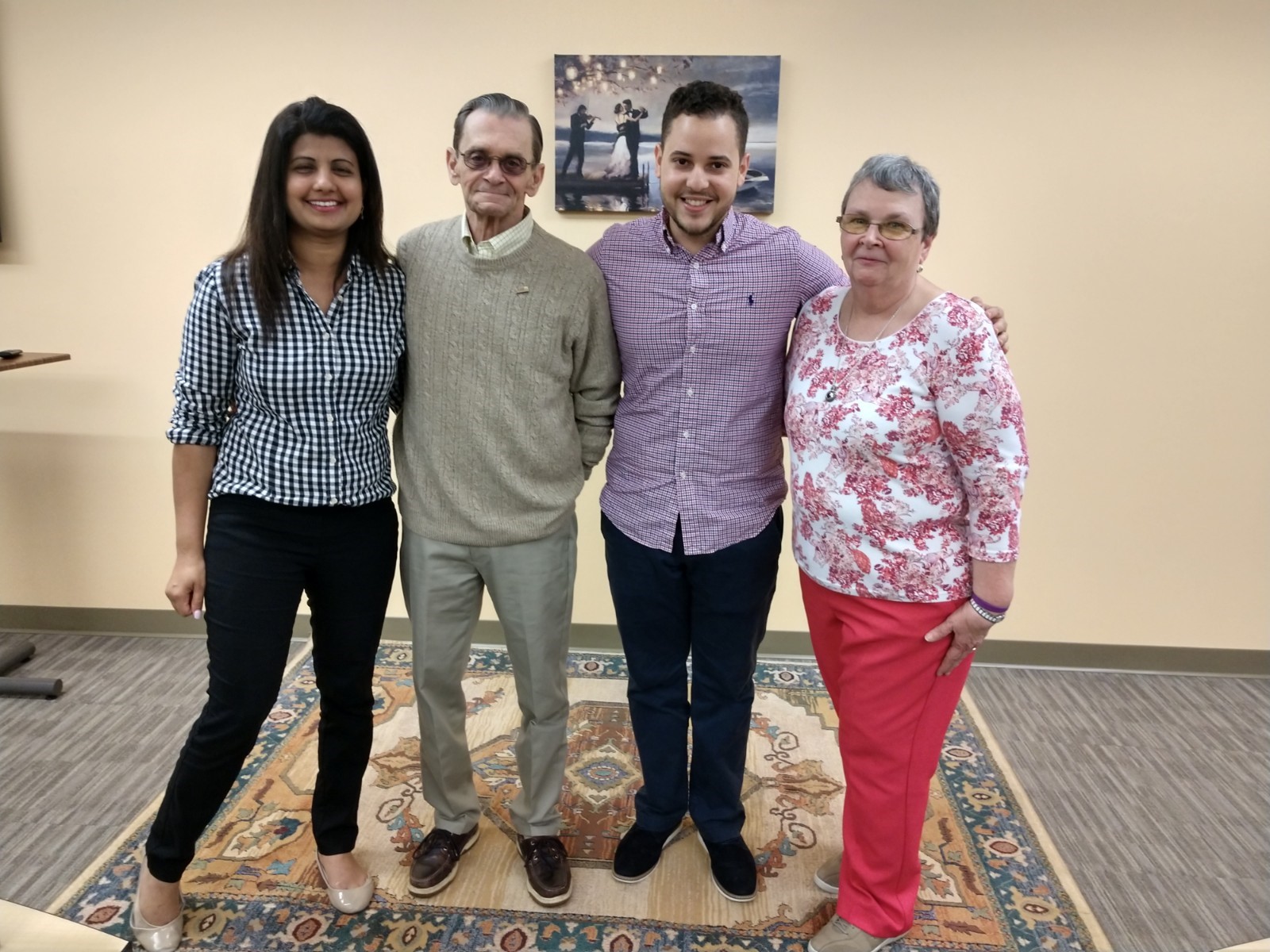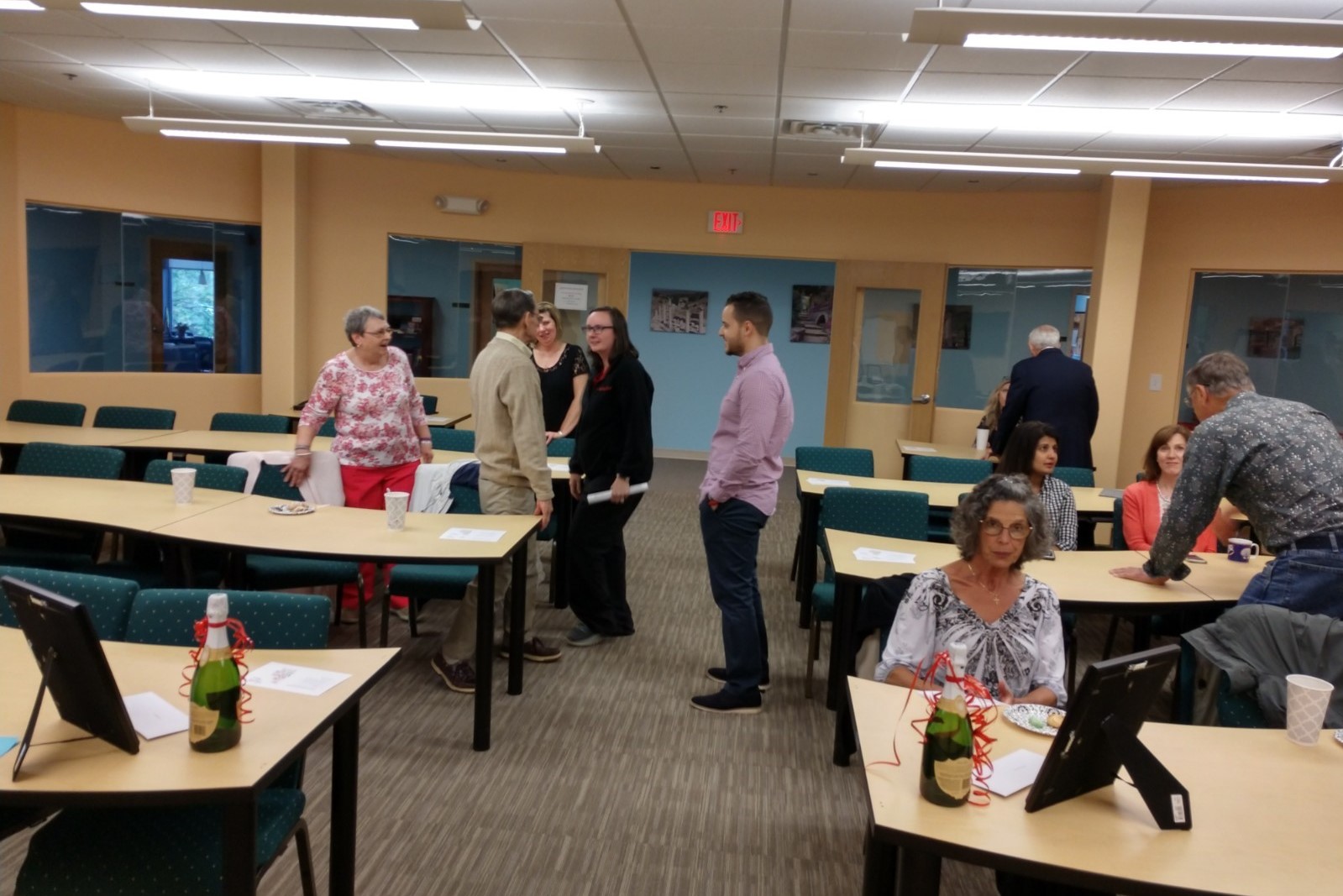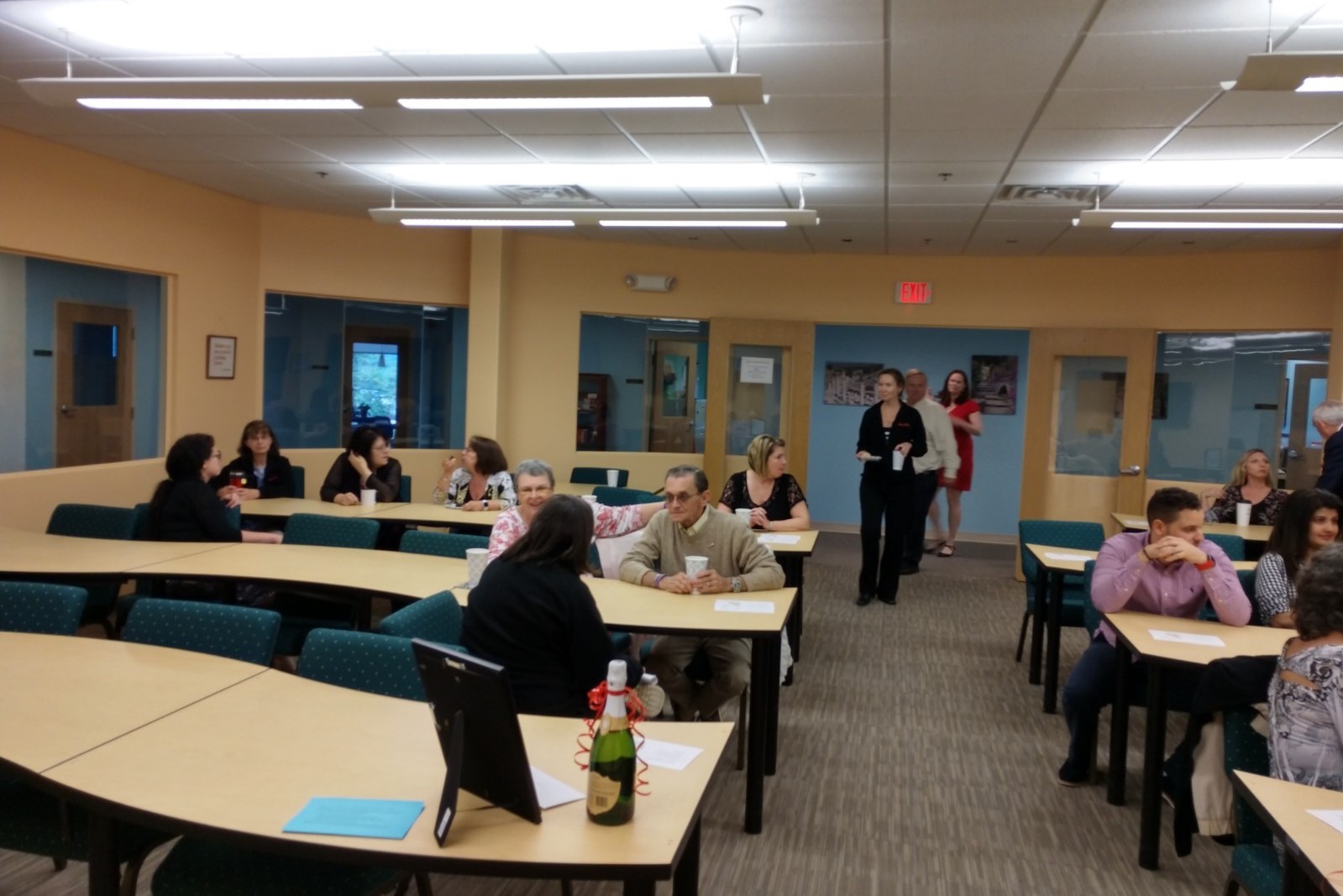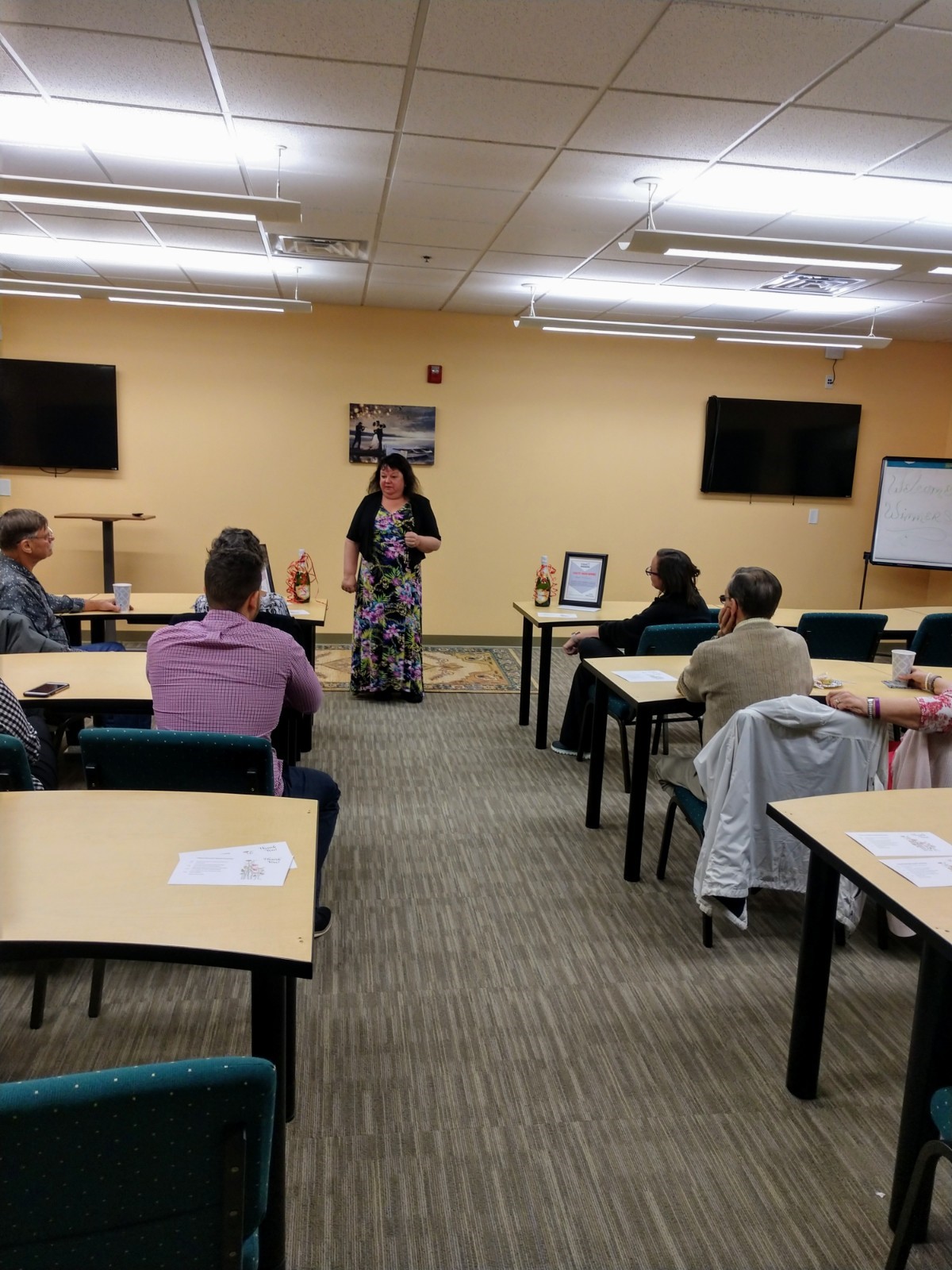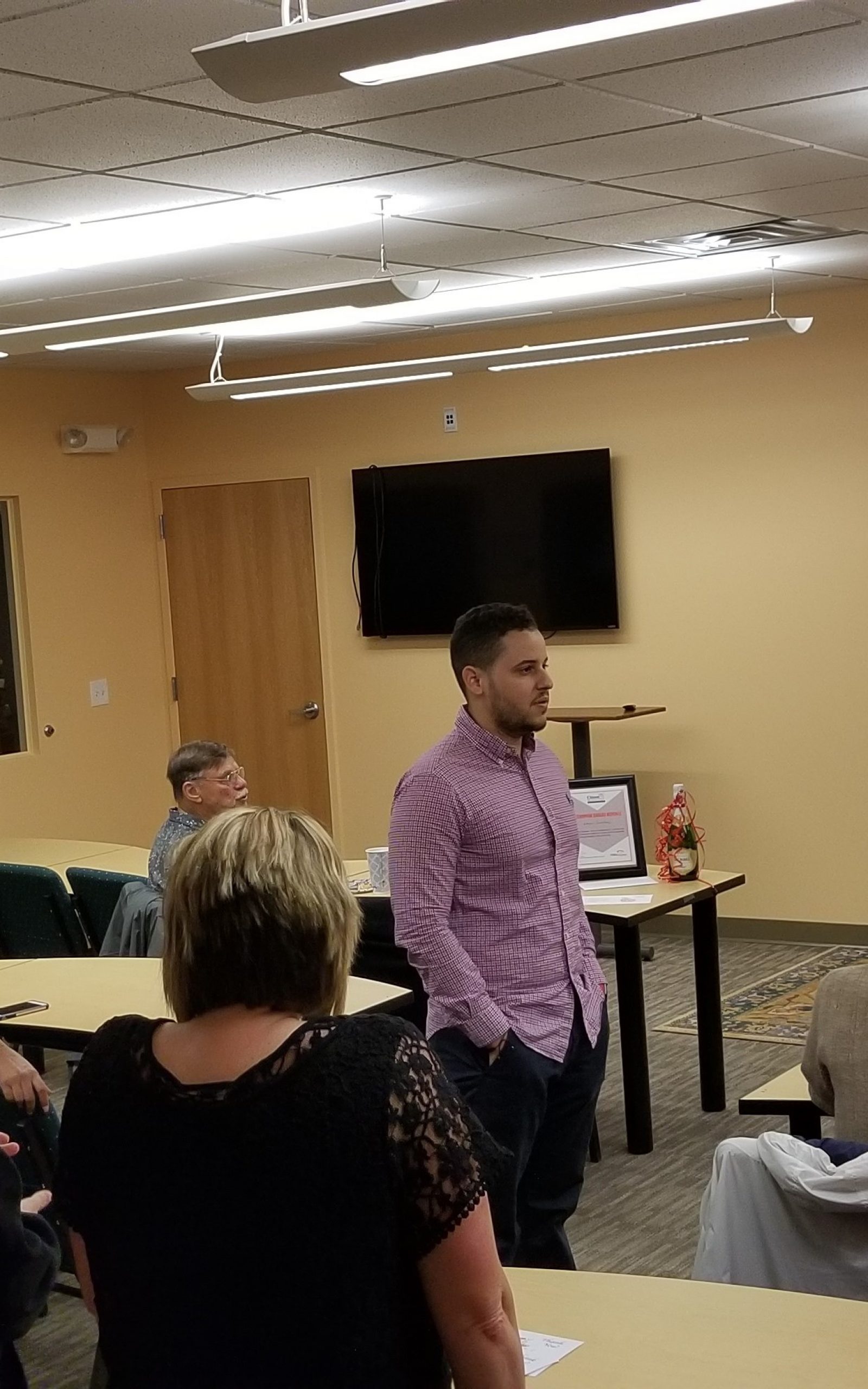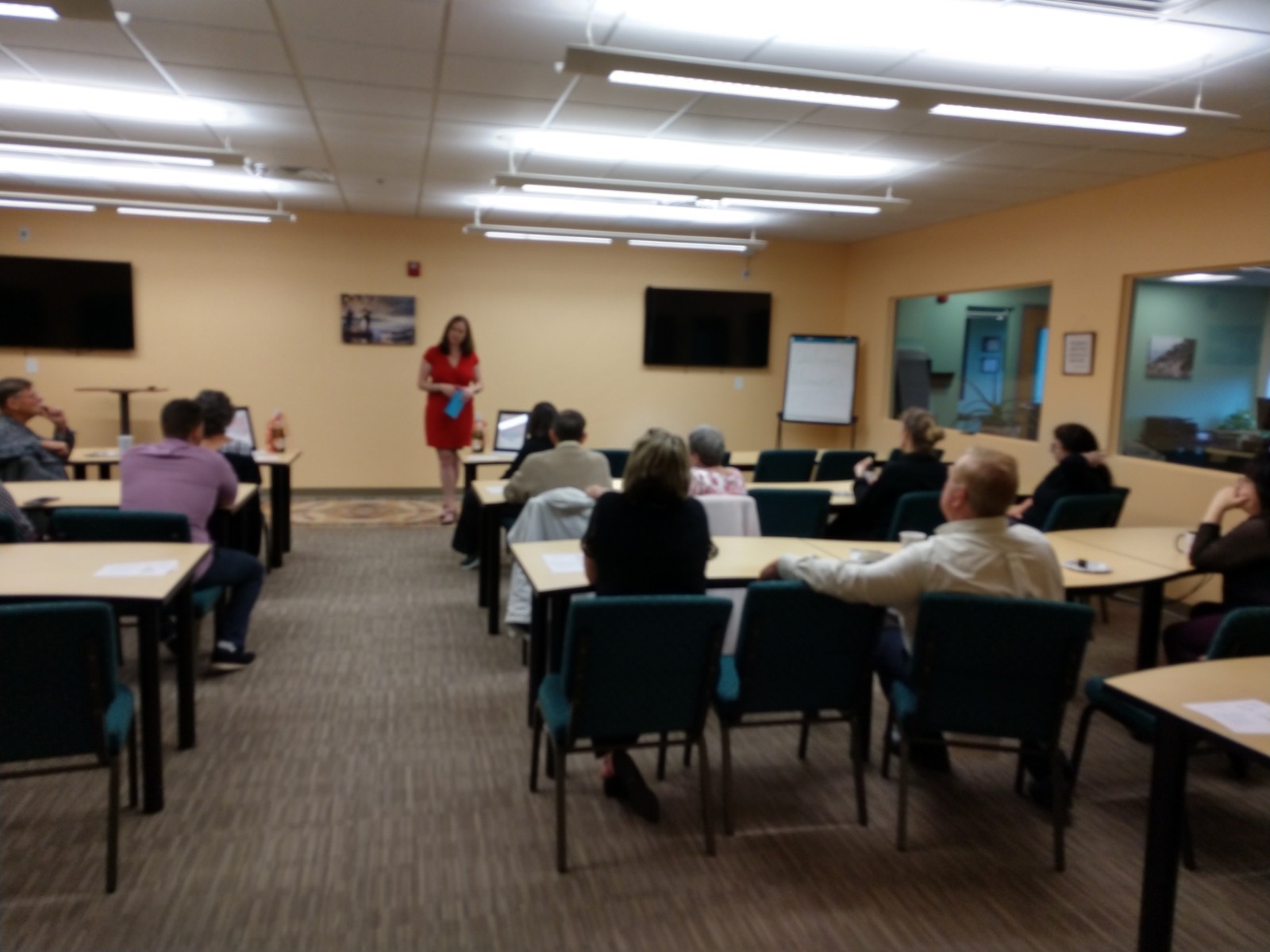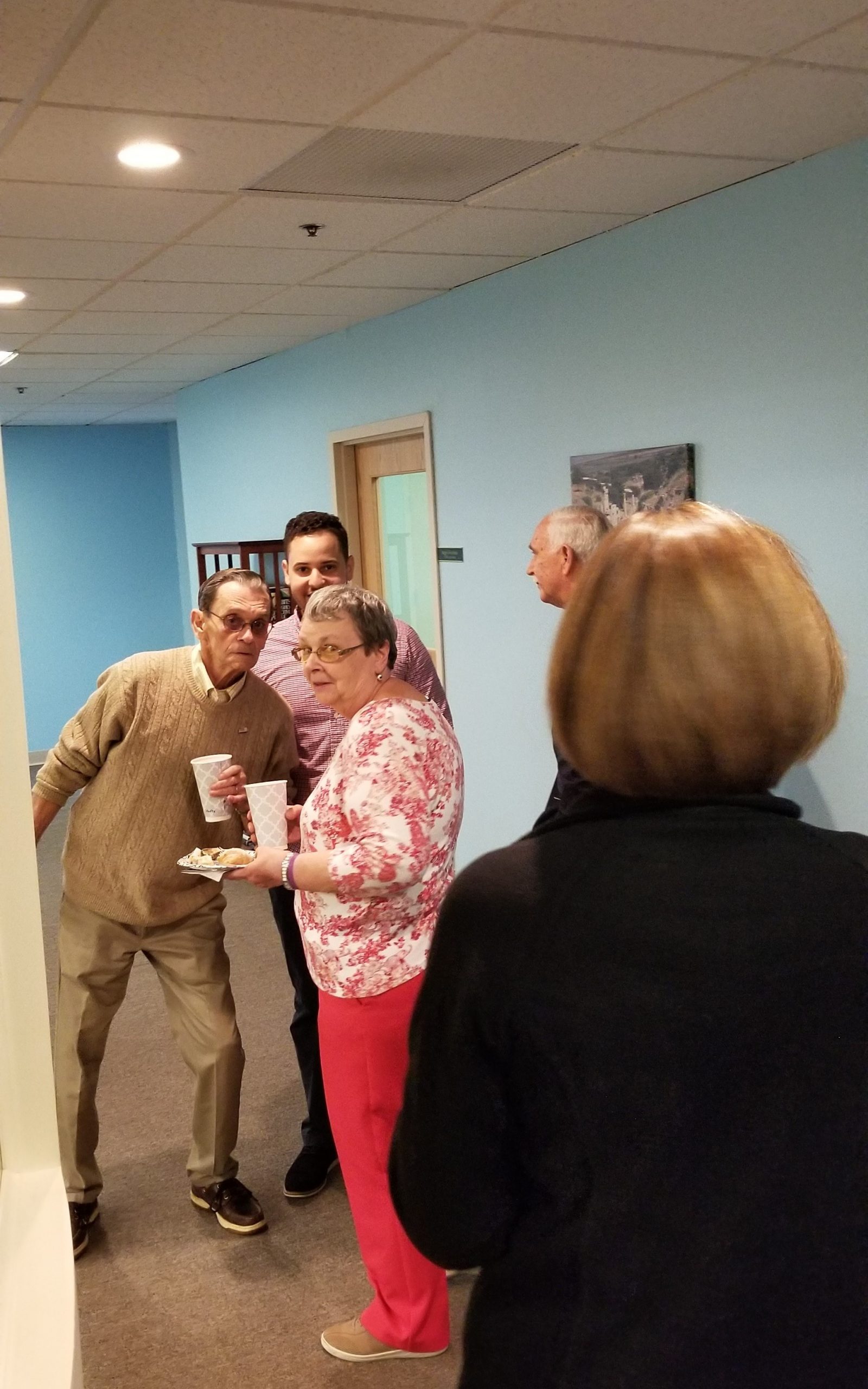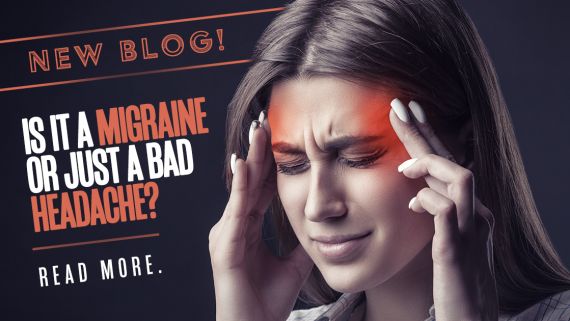Jon Younger with Assisted Living Locators interviews ActivMed’s Outreach & Events Manager, Laura Rocha. Watch as they discuss Free Memory Screenings and clinical research.
Today we are celebrating Clinical Trials Day #CTD2020
Clinical Trials Day is celebrated around the world in May to recognize the day that James Lind started what is often considered the first randomized clinical trial aboard a ship on May 20, 1747. Read more about this innovative approach here.
At ActivMed, we work hard every day helping our community by bringing together researchers who want to explore new medications, treatments, devices, and more, with people who are also looking for better treatments and want to contribute to help future generations.
Thank you to all our wonderful staff, who contribute to moving public health forward!




If you have survived a stroke or heart attack, your chances of having another one are 1 in 4. The good news is, up to 80% can be prevented through managing chronic conditions, and lifestyle modifications. May is American Stroke Month, and the 2020 initiative is “One is Enough” which focuses on preventing another stroke. Not all risk factors are within your control, but for the ones we can control, it is time to make changes, even in the midst of COVID-19.
Chronic Conditions and Stroke Risk

A stroke happens when a clot or rupture blocks blood vessels that carry oxygen and nutrients to the brain. This disruption in the flow of these vital nutrients results in the death of brain cells. Depending on the severity of the stroke, and where it occurs in the brain, the resulting damage can vary. Stroke sufferers can have paralysis, speech or language problems, memory loss, and changes in behavior.
Several risk factors increase your risk of stroke. Family history, age, and gender are factors that no one can change. However, managing chronic conditions such as heart disease and diabetes play a vital role in prevention and reoccurrence. Diabetes and heart disease impairs your body’s ability to effectively transport oxygen and the critical nutrients we mentioned earlier to your brain. By working with your doctor and following their plan to manage these conditions, you can reduce your risk of stroke. Eating a healthy diet, staying active at least 150 minutes a week, and living tobacco-free are some of the lifestyle recommendations the American Stroke Association suggests in addition to the management of chronic conditions.
Hidden Dangers of Stress and the Pandemic
The COVID-19 pandemic has taken the world by storm, changing life as we knew it. In addition to fears of contracting the virus, many lost their jobs and businesses, creating a financial and emotional strain few have seen before. During these unprecedented times, stress levels have understandably risen. However, continued stress over long periods can increase your risk of developing certain heart diseases such as high blood pressure if not managed. High blood pressure is the number 1 controllable risk factor for stroke.
Know the Signs
The American Stroke Association uses the acronym “FAST” to help recognize the symptoms of a stroke to get immediate medical attention. It may mean the difference between recovery and disability, so knowing the signs is vital:
- F (Face Drooping)- Does one side of the face droop, or is it numb? Ask the person to smile. Is the person’s smile uneven or lopsided?
- A (Arm Weakness)- Is one arm weak or numb? Ask the person to raise both arms. Does one arm drift downward?
- S (Speech)- Is speech slurred? Is the person unable to speak or hard to understand? Ask the person to repeat a simple sentence.
- T (Time to call 9-1-1)- If the person shows any of these symptoms, even if the symptoms go away, call 9-1-1 and get them to the hospital immediately.

ActivMed offers free health screenings for blood glucose, blood pressure, and more. To learn more, visit our website here.
During COVID-19, ActivMed Practices and Research is committed to ensuring the safety of our patients and staff. Click here for our latest COVID-19 facility updates.
References:
https://www.stroke.org/en/life-after-stroke/preventing-another-stroke
CBS Boston interviews ActivMed researcher, Dr. Demetrius Rizos.
Dr. Rizos and his wife, Susan, who is a nurse, have been working on the front lines during the COVID-19 pandemic. Dr. Rizos has been volunteering at North Central Bronx Hospital, and his wife is working in the ICU at Beverly Hospital. Dr. Rizos has been a researcher with ActivMed for several years, and Nurse Sue has also joined our team in 2019. Thank you Dr. and Nurse Rizos for your selfless love for others!
You can read the article here.
Just a few short months ago we rang in 2020. We all had different expectations for what the year was going to bring, but none of us could have ever imagined how the coronavirus outbreak would have changed life as we knew it. The altered daily routines, social isolation, overall uncertainty, and financial pressures can be overwhelming, especially for those already dealing with mental health issues. Learning some self-care strategies can help when it comes to coping with your mental health during this time. Let’s discuss.
Change can be stressful for anyone. Doing your best to maintain a routine in times like these can help you to stay in the right mindset. Perhaps you are now working from home on a daily basis instead of commuting to the office each day. Designate a work area, get up, shower and get dressed, and keep normal working hours. Doing your work in the same area where you binge-watch your favorite TV shows can be distracting and hard to separate work from home. Even if you’re working with minimal square footage, make sure your workspace and your relaxing space are separate.

Make sure to take care of yourself. It can be tempting to want to lay around and order Chinese take-out while you relax on the sofa all day. Instead, try to eat healthy, well-balanced meals. Exercise regularly and get plenty of sleep. Meditation has been shown to be helpful for a variety of conditions and can be done in the smallest of spaces – even if you’re confined to a studio apartment.
Don’t lose your outside connections. Social distancing doesn’t have to apply to the virtual world! Find the time each day to reach out to friends and family via phone, text, email, FaceTime, etc. There are several apps that allow you to meet up and “hang out” virtually with your friends and family members. You can even host events like book clubs this way or attend art classes or exercise classes.

Don’t be afraid to get help when you need it. When it comes to your mental health, it’s important to be upfront about how you’re doing. Expecting mental health issues to fade on their own can lead to a worsening of symptoms, so it’s key to ask for help when you have concerns. ActivMed offers depression screenings at no cost to you or your insurance. To learn more about requesting a screening appointment, visit https://activemedredev.wpengine.com/join-a-trial/free-medical-screening/. Research studies may also be an option. If you or someone you love is experiencing struggles with mental health, research studies may be an option. Participants may see a doctor or medical staff, have access to study drug, and may receive reimbursement for travel. Learn more about current and upcoming studies @ https://activemedredev.wpengine.com/join-a-trial/.
Now more than ever, we’ve been hearing a lot of chatter about vaccines due to the COVID-19 pandemic. The time it takes to create a vaccine and how effective they are is something we are all interested in.
Here is some important information on vaccines and some things our team thinks you should know.
How do vaccines work?
To better understand how vaccines work, it’s important to know how our body fights off illnesses. When a virus or bacteria enters the body, it attacks and multiplies causing infection. In response, the body uses its tools (i.e. white blood cells, which are our immune fighting cells) to fight off the infection. It can take several days to a week for our body to fight off an infection, but once it does, the immune system remembers what it learned when it comes in contact with that virus or bacteria in the future.
Vaccines work by imitating a virus or bacteria without ever causing the illness. Our immune system responds the same way that it would if we were truly infected, creating the same antibodies that protect us in the future.
How long does it take to produce and distribute a vaccine?
When it comes to production of a vaccine, we’ve heard some conflicting timelines in the news lately. Typically, when new therapies are developed for any illness, it can take many years for an approval to be received and distributed to the public on a mass scale. This is due to the time it takes to go through all 3 phases of research to ensure the therapy is safe and effective.
Some vaccine trials can happen more quickly with an FDA fast-track status.
Read more about the vaccine approval process here.
How effective are vaccines?
Vaccines are highly effective and safe for the general public. Take measles for example; vaccines were responsible for eliminating the disease back in 2000. As more and more people stopped vaccinating against measles, it made a comeback in 2019 causing over 1000 cases of measles in the US.
The polio vaccine is also another great example. The first vaccine was given in 1955 and by 1979 polio was eradicated from the US, while in other countries, it continues to be a concern.
Vaccines have undoubtedly saved lives and our team is dedicated to helping advance vaccine research, contributing to success stories like measles and polio.
How do I get involved?
ActivMed Practices & Research, Inc. conducts clinical trials in a multitude of therapeutic areas. To learn more about how you can participate in our enrolling studies or future studies for COVID-19 or other vaccines, please choose the location you prefer.
Participants may see a doctor or medical staff, have access to study vaccines or study drug, and may receive reimbursement for travel.
Get involved today and make a difference for generations to come.
The skin is a barrier that protects, warms, and cools our bodies. When there is an issue with the skin like psoriasis, those functions are compromised, leading to overwhelming physical and emotional effects. According to the National Psoriasis Foundation, an estimated 20,000 American children under the age of 10 are diagnosed with psoriasis each year. Understanding when those itchy red spots need to be examined by a doctor starts with recognizing some of the common symptoms.

Symptoms
Psoriasis modifies the skin renewal process. Usually, the skin cells will mature and die then shed while new skin cells are made underneath, which takes around three to four weeks. Psoriasis causes the immune system to be activated mistakenly, speeding up the life cycle of the skin cells to three to four days. Rather than falling off, the dead cells build up on the surface of the skin, forming thick, red, scaly patches.
The most common form of psoriasis in children is plaque psoriasis. The patches vary in size, number, and can appear anywhere on the body, but typically occur on areas like the knees, elbows, and scalp. They can also be very itchy and sometimes burn. Dermatologists specialize in skin disorders and are the best option for accurate diagnosis and treatment since there is no specific diagnostic test or tool. The dermatologist will examine the affected areas and may take a sample of it to view under the microscope.
Treatments
Psoriasis treatment depends on the severity, type, and area of skin affected. Untreated psoriasis can lead to plaques that continue to build and spread. Minimizing the scaling, itching, discomfort, and inflammation is the goal of available therapies. Topical treatments such as creams, or shampoos, UV phototherapy, oral medications, and injected biologics are some of the choices.
Finding the best way to manage your child’s psoriasis that has the best effect may take some time or require a combination of available treatments. In most cases, many children can achieve symptom relief with the right medication.
In children where effective psoriasis treatment remains out of reach, clinical research is the key. In order to discover how to prevent, improve treatment of, and eventually cure psoriasis, more work needs to be done through clinical research studies. Volunteers participating in clinical trials are the only way these advances become possible.

To learn more about currently enrolling pediatric psoriasis studies at ActivMed click HERE.
COVID-19 UPDATES
ActivMed Practices and Research is committed to ensuring the safety of our patients and team. During this time, we are taking additional precaution listed below. If you have any questions, please reach out to the appropriate office.
For Patients:
We are still open for visits; a member of our team will contact you prior to ask about recent illness and travel. As soon as you arrive, your temperature will be taken. If you have a fever, you will be asked to go home and come back once your symptoms have resolved. Per state guidelines, we are asking patients to wear masks when visiting our site. If you do not have a mask, we will provide one to you.
Please reschedule your visit if you
- Are experiencing respiratory symptoms, fever, or shortness of breath
- Have traveled to any countries that have a Level 3 Travel Health Notice in the last 14 days: https://www.cdc.gov/coronavirus/2019-ncov/travelers/after-travel-precautions.html
- Have been in contact with any individual diagnosed with COVID-19 in the last 14 days
For Sponsors:
All on-site visits have resumed. We are following social distancing guidelines and are staggering monitors and visitors. We are still accommodating remote monitoring, site selection visits, closeout visits, etc. Please reach out to us to arrange your visit.
In 2009-2010 ActivMed Practices & Research participated in clinical research trials for development of vaccines and research for the Swine Flu epidemic. The new vaccines were successful in slowing and stopping the epidemic. We are hopeful the same can happen with the current epidemic.
Our staff and offices are patiently standing by and awaiting the development and implementation of coronavirus vaccine trials, that could help prevent and stop the spread of this disease. We will be keeping you updated as we find out more about when these trials will be coming to our local area.
For now stay safe and follow the CDC recommendations.
Terry L. Stubbs MA,CCRC,AS,CRQM
President and CEO
Glucose or sugar is an essential source of fuel for your body. Type 2 diabetes affects the way your body metabolizes glucose. It used to be known as adult-onset diabetes. However, in recent years, the number of children diagnosed has risen with childhood obesity rates. As with other chronic conditions, diabetes must be managed appropriately to avoid irreversible issues later in life.
What Causes Diabetes?

Just as glucose is an important source of fuel, insulin is a hormone that helps regulate the movement of sugar into your cells. Insulin is produced in the pancreas gland. In type 2 diabetes, your body is resistant to insulin, or cannot produce enough insulin. Without insulin, too much glucose stays in your blood. If too much is in your blood, it begins to stick to the blood vessels and will eventually impede blood flow.
Many of the complications from diabetes take a while to develop. Heart disease, nerve damage, kidney damage, and eye damage are a few of the conditions diabetics are at risk for. Symptoms include frequent urination, increased thirst and hunger, fatigue, and blurred vision. Being overweight, genetics, and other environmental factors are possible causes.
What Increases Your Risk?
Some individuals will have a predisposition to developing diabetes due to family history or race. Other causes that raise your risks of developing diabetes are:
- Weight– You do not have to be overweight to develop diabetes but being overweight is a leading risk factor.
- PCOS– Insulin resistance is a cause of PCOS, so those diagnosed often develop diabetes if not managed.
- Inactivity– Physical activity helps manage your weight and uses up the glucose as energy allowing your body to use the insulin properly.
- Gestational Diabetes– Raises your chances of developing diabetes later down the road.
Life with Diabetes
Managing your diabetes involves monitoring your blood sugar levels, eating a diabetic-friendly diet, and keeping active. Individuals may be able to manage their diabetes through diet and exercise, but medications and insulin therapies are available if further intervention is needed.

Diabetes research continues to transform the way this condition is managed for the 1.5 million Americans diagnosed each year. The possibilities for less invasive and more cost-effective options are on the horizon. To learn more about how you can get involved in the diabetes research studies ActivMed is currently conducting at our Methuen, MA location, call (978) 655-7155, or visit us here.
References:
https://www.diabetes.org/diabetes/type-2
https://www.mayoclinic.org/diseases-conditions/type-2-diabetes/diagnosis-treatment/drc-20351199
https://www.kidney.org/atoz/content/Diabetes-and-Your-Eyes-Heart-Nerves-Feet-and-Kidneys
ActivMed participated in the 2019 Citizen Scientist Awards program to honor those who have made the valiant effort to participate in clinical research for Alzheimer’s.
The Global Alzheimer’s Platform Foundation (GAP) created a first-of-its-kind award to celebrate Alzheimer’s disease clinical trial participants. The only way to find treatments and cures for Alzheimer’s is through clinical trials and these volunteers make that research possible. Each participating site submitted nominees for a national award. Here are the national winners.
Citizen Scientist Award Honoree Rochelle Long (OH) received the Cornerstone Award. Watch her inspirational story here!
Citizen Scientist Honoree Barbara Silva received the Catalyst Award.
Our site will be nominating folks again this year, so stay tuned for our 2020 nominees!
To find out more, please contact csa@globalalzplatform.org
Your brain, like your body, goes through change as it ages. As a result, we may not remember things as well as we did before. It may take longer to learn something new and losing things may happen more often. Forgetfulness that goes beyond the occasionally lost keys and inability to remember a name may be a cause for concern. Although some people experience memory issues as a result of treatable conditions, Alzheimer’s-related memory loss gradually gets worse over time. Memory screenings serve as a baseline to evaluate our current memory and how it changes over time. They are also a good way to see what is typical as we age, and what is not.
Why Should I Get a Memory Screen?

It is recommended if you are 65 or older to have your memory assessed yearly; however, if your memory issues concern you at all, talk with your doctor. They can help rule out any treatable conditions or determine if further evaluation is needed for something more serious.
Alzheimer’s symptoms typically begin before people notice since mild to moderate memory issues are typical with aging. Early diagnosis of Alzheimer’s or other forms of mild cognitive impairment helps you educate yourself and your family about the disease, allowing you to begin treatments to manage symptoms.
The National Institute on Aging lists the following as some of the signs of a more serious memory issue:
- Making poor judgments and decisions a lot of the time
- Problems taking care of monthly bills
- Trouble having a conversation
- Losing track of the date or time of year
- Misplacing things often and being unable to find them
Free Memory Screening
The National Institutes of Health (NIH) is now recommending that everyone get a baseline memory screening, then a yearly follow up memory exam to look for cognitive changes.

ActivMed offers free memory screenings at their Lawrence, Methuen, and Lowell offices for anyone over the age of 50. The memory exam will determine a generalized score from the cognitive assessment—the score aids in identifying if the cognitive decline is reasonable, mild, or moderate. The results are reviewed and signed by a physician, and copies can be given to you or sent to your doctor to evaluate. You can fill out our free memory screen request form here.
References:
https://www.nia.nih.gov/health/noticing-memory-problems-what-do-next
https://www.mayoclinic.org/diseases-conditions/alzheimers-disease/in-depth/memory-loss/art-20046326
https://www.ncbi.nlm.nih.gov/pmc/articles/PMC1123445/
We had a great turnout for our 2nd training event for Alzheimer’s Disease and Dementia Care on February 7th.
Several members of our staff and those in the community took the path to become a Certified Dementia Practitioner with Tammy Pozerycki. This one-day seminar allows the attendees of the training to earn 8 hours of continuing education and/or apply to the NCCDP for their Certified Dementia Practitioner certificate.
ActivMed has partnered with Tammy from Alternatives in Alzheimer’s Care to host these events in our Methuen Learning Center. This was the second CDP training event, and two more are planned for May and October of this year. Visit our Event Calendar for these and other local events.
For more information about Tammy Pozerycki and her training seminars email tammy@altalz.com or 508-861-6709
or visit www.alternativesinalzheimerscare.com



Being heart healthy and knowledgeable is so important for your overall well being. Knowing the steps to take to achieve a healthier life style can truly make an impact on someone’s daily life. There is a misconception that heart failure means that the heart completely stops. Heart Failure means that the heart does not pump blood and oxygen throughout the body the way it should. This condition affects affects about 5.7 million people in the U.S. but there is hope.
Heart Healthy Foods
There are several foods you can eat more of tips for maintaining a healthier heart. Berries, acai and tomatoes are some of the many heart healthy foods to include in your diet. Learn more here.

Exercise
Think its too late to exercise, especially if you are not used to the routine? Think again! According to the Harvard Heart letter, “even short forms of structured exercise may improve your heart health.” Starting out with walking at least 10 minutes a day can really make a difference, especially if you are new to the routine. Click here to learn more about exercising techniques.

Looking forward
There is a lot you can do to maintain a healthy heart. If you are struggling, don’t give up hope. If you would like to know more about how you can check up on the overall status of your health at no cost, learn more about our free screenings here. Our free screenings include checking for blood glucose, depression, memory loss, blood pressure, and pulmonary function. Learn more today! And remember to schedule regular check-ups with your doctor. If you want to make your doctor happy, keep good records of your vitals or lab numbers, and bring them to your appointments.

Seasonal Depression
It’s very common to feel sad during this winter season. Millions of Americans suffer from some form of depression every year. That being said, you are not alone. There are many resources to help including free screenings, therapy, support groups, exercising, and many more. However, admitting that you want help is the first step to living a happier and healthier life.
Statistics

Most Common Signs And Symptoms of Depression
- Loss of interest in activities that were once enjoyable
- Fatigue and lack of energy
- Appetite or weight changes
- Physical symptoms such as headaches, stomachaches, or back pain
- Recurrent thoughts of suicide
- Difficulty sleeping, sleep disturbances, and/or having a hard time getting out of bed
- Difficulty thinking clearly, making decisions, or concentrating
- Feeling of isolation or wanting to be isolated for long periods of time
Possible Treatment Options
- Sign up for a clinical trial and/or free screenings for depression
- Therapy – speaking with a psychologist
- Medication
- Exercise (physical and mental), Yoga, Meditation
- Keeping a journal (writing down your thoughts instead of bottling them up)
- Write short and long-term goals for yourself
- Calling a depression hotline if you don’t feel comfortable talking to a therapist
- Seeking support groups, or talking to someone you feel close to
Clinical Research May Be An Option!
As mentioned, participating in a clinical trial is available as a treatment option. The benefits of volunteering for a study include, but are not limited to the following:
- Helping future and current generations
- You or your loved one may have access to new treatments, not available to the public
- Data collected from the results is used to determine whether a new medication or therapy is safe and effective.
ActivMed Practices & Research Inc. is passionate about helping those with depression by conducting clinical trials. If you or someone you know is diagnosed with depression or is not sure whether they have depression learn about these study opportunities and see if you qualify. Click HERE.
Looking Forward
Recovery is a slow process, but these treatment options can be very helpful. However, it is not a race, and you shouldn’t put too much pressure on yourself to get better right away. Depression affects people of all ages, races, ethnicity, and backgrounds. Depression can be deceiving in the sense that the people who appear to be “fine” are actually the people who are struggling with it the most. It is also good to help others who suffer from depression as well. Together we can be healthier.
We are excited to announce another donation yet again! We donated $1,500 to Pease N Carrots, an organization that holds annual food drives for those in need. We have been supporting them for 4 years now, and we are very grateful to be able to lend a helping hand!

Ever wondered what a medical screening is and how it could benefit you? Health screenings are tests that look for diseases before you have symptoms. Screening tests can find diseases early, when they’re easier to treat. You can get some screenings in your doctor’s office. Others need special equipment, so you may need to go to a different office or clinic.
Some conditions that are commonly screened for include:
- Breast cancer and cervical cancer in women
- Colorectal cancer
- Diabetes
- High blood pressure
- High cholesterol
- Osteoporosis
- Overweight and obesity
- Prostate cancer in men

ActivMed Practices & Research Inc provides health screenings at no cost to you.
At ActivMed Practices & Research Inc., we offer free medical screenings for Depression, Blood Pressure, Blood Glucose, Memory, and Lungs. Which tests you need depends on your age, your sex, your family history, and whether you have risk factors for certain diseases. After a screening test, ask when you will get the results and whom to talk to about them. Visit our free screenings here.
Memory Screening
Curious as to what to expect from a memory screening? A memory screening can help detect if an additional check-up is needed by a qualified healthcare professional. Interested in learning more? The following article provides more information on memory screenings.
**UPDATE**
We are now able to offer a no contact Telehealth Memory Screening- All information is confidential, following all HIPAA guidelines.
Call us at 978-655-7155 to learn more or request a call online here.
We are excited to announce our collaboration with NENA – New England Neurological Associates. We are currently enrolling studies in Lawrence, MA for Parkinson’s and Alzheimer’s Disease. To visit our enrolling studies page, click here. For more information, contact Deepa at 978-992-4212.


We are excited to announce our $4,000 donation to Emmaus, a local homeless charity in Haverhill, MA. Since 1985, Emmaus has helped over 35,000 children, women, and men out of homelessness and toward permanent housing, jobs, and self-sufficiency. For more information on how you can donate, click here https://lnkd.in/ewHhMkx

Laura Rocha joins Health Happenings on Methuen TV to discuss Age/Dementia Friendly initiative in Methuen
Local TV show features our Age/Dementia Friendly Methuen initiative
Our Outreach Manager, Laura Rocha recently appeared on the local television show “Health Happenings” for Methuen TV, on a panel discussing our Age/Dementia Friendly Methuen project we have been working on with Methuen Mayor, Jim Jajuga. We will miss him, and look forward to continuing the initiatives with the Mayor-elect Neil Perry.
Watch the discussion here http://archive.methuentv.org/Video/5398
According to the Alzheimer’s Association, a dementia–friendly community is a city, town or village where people with dementia are understood, respected and supported. In a dementia–friendly community people will be aware of and understand dementia, so that people with dementia can continue to live in the way they want to and in the community they choose.
We have partnered with other key community partners to make this initiative work for the city:
Here’s what we have accomplished so far:
Spring 2019- ActivMed met with Mayor Jim Jajuga to present the idea and address the needs of the community
Summer 2019- Mayor Jajuga and several city officials came to ActivMed to receive Dementia Training from the Alzheimer’s Association
Fall 2019- Focus Group to share ideas and to get feedback directly from the citizens of Methuen
Coming soon in 2020- Training of First Responders!
There is still plenty of work to be done, so stay tuned for more updates!
ActivMed’s growth in 2019 has been extraordinary!
2019 is approaching its’ end, and what better way to end it then to recap what has happened at ActivMed Practices & Research, Inc. This year ActivMed turned 25 and what a year of growth it has been! We have accomplished so much and we could not have done it without you!!
This year we are proud to announce the beginning of a new sister company called Allcutis Research!

Allcutis is the new sister company for ActivMed Practices & Research, focusing on dermatology studies.
Within this company we can conduct all our dermatology trials. Over the years we have conducted studies in a variety of indications and this company will allow us to zero in on the specific dermatology studies. Check out the new website for more specialized info regarding our dermatology side of the business. www.AllcutisResearch.com
Aside from doing the business of conducting research to help our patients and future generations, we are passionate about being involved in the community! Throughout the year we participated in local charities to benefit needy children, community health fairs and events, like presentations from our CEO, and training for healthcare workers, that help raise awareness of clinical research.
Shades of Hope 2019 – Impact Melanoma: As sponsors of Impact Melanoma, we were thrilled to spend the evening with others and welcome Dr. Jerome Adams (featured on the left) and his wife Lacy Adams (featured on the right), a melanoma survivor.
Walk to End Alzheimer’s- Each year we sponsor and participate in two local Walks to End Alzheimer’s. We want to raise awareness that you can do more than just “walk” to further research, you can volunteer! For those that come out to support their loved ones, we also offer information about getting an annual Memory Screening.

Toy Drive – happens annually around December, and newly unwrapped gifts are collected for the children of the Boys and Girls Club in need.

Clothing Drive (Catie’s Closet)- Each year we take donations for this local charity that helps students start the school year with new clothes.
Honorable Mentions
We have partnered to host a National Council of Certified Dementia Practitioners’ Alzheimer’s Disease and Dementia Care seminar.
- Our first training was held November 16th, 2019.
- Three of our employees, Karina, Laura, and Jennifer attended the training and are now eligible to receive certification.
- Save the Date in order to take the path to becoming a Certified Dementia Practitioner
- Our next training is happening on February 7th, 2020!
- Attend and receive your Certificate of Attendance, which is the requirement in order to apply to National Council of Certified Dementia Practitioners’ to receive your credentials as a Certified Dementia Practitioners.


- Citizens Scientists Awards Ceremony – An afternoon tea was held to recognize our Citizen Scientist Award nominees on June 20, 2019. This is a Global Alzheimer’s Platform Foundation initiative that we are proud to be a part of. More awareness of clinical trials is needed, and what better way than to celebrate those who are willing to participate?!

![]()
Recipients with our study coordinators Deepa (far left), and Alfa (far right)
Studies and Free Health Screenings
We continue to be a sought- after site for many pharmaceutical companies, both locally and on a global level, for a variety of indications. Some of the studies we enrolled and continue to enroll in our Methuen, MA office include Diabetes, Depression, and Memory. Our Portsmouth and Beverly offices focus on dermatology studies like psoriasis and eczema. For a complete list of our studies, visit, https://activemedredev.wpengine.com/join-a-trial/ Participation is free of charge is you qualify.
We also offer Free health screenings to the community to help encourage people to be pro-active about their health! Our screenings are simple assessments that include Depression, Memory, Blood Pressure, Blood Glucose, and Lung Function. Click here to sign up for your appointment today!
The future is bright for 2020 and we have many more growth projects on the horizon!!
Why participate in clinical research?
We interviewed a research volunteer to hear what he had to say about participating in a clinical research study.

In clinical research, there is still a need to increase awareness of clinical trials being conducted locally. We offer people the ability to participate in research without having to go to Boston or big hospitals. So we wanted to interview a research participant in one of our studies to give a first-hand account of what being a participant looks like. We sat down with Mr. M to see what he has to say about being in a study here at ActivMed.
1. Why did you choose to participate?
“A number of reasons. Number 1: What I go through helps everyone. Number 2: Money. My wife and I live on a fixed income and the money I receive from participating does help. Number #3: I’m doing it for myself as well. I’m focusing on having good health, which always helps me to continue doing what I love.
2. What did you expect research would be like?
“I was hoping it would show me improvement on what I have. I was hoping it would help. The research staff were what I expected, and friendly.
3. How did you feel emotionally by participating?
“Felt comfortable. These are professional people and it gave me the confidence to trust that they knew what they were doing.”
4. Is there anything that surprised you?
“I came to the study with an open mind.”
5. If you could share something with someone participating in a study for the first time, what would it be?
“If you have the problems I have, do it! I could have or could have not been given a placebo. What matters is that the information collected will help somebody else.”
We are so thankful that Mr. M allowed us to ask him some questions about his participation. *Due to privacy requirements, we cannot share his full name.
Participating in a clinical research study is a personal choice!
If you have questions and aren’t sure who to ask, check out our FAQ section here to learn more. Your PCP is a great resource to see if a clinical research study is a good fit for you based on your medical history.
If you would like to know more, you can always call us and we will be happy to answer any questions you may have!
Methuen, MA 978-655-7155
Beverly, MA 978-969-6897
Portsmouth, NH 603-319-8863
It was an honor to have attended Shades of Hope 2019 to celebrate Impact Melanoma’s 20th Anniversary!! it was an amazing party and we were thrilled to welcome U.S. Surgeon General VADM Jerome Adams, MD and his wife and melanoma survivor Lacey Adams!
Participating in a pediatric research study
It is the responsibility of those conducting clinical research to ensure the safety and confidentiality of their participants. Participating in a study is not as intimidating as it may sound. If anything you might find that participating in a study is quite simple and less nerve-wracking than going for that annual check-up. Our children deserve the best care available, and if current treatment options to any conditions they are experiencing are not enough, then looking to clinical trials might be beneficial!
Some of the benefits of enrolling your child in a study include the following:
- To obtain education about treatment/improving child’s health
- To advance medicine or science
- To help other kids with the condition
- To obtain free medication for your child

What does participating in a study involve?
At ActivMed, participating in a research study is very similar to a regular doctor appointment. Our convenient locations allow you to participate in research without traveling to Boston or a hospital. When you choose to participate in research you are under the care of a doctor, who will monitor your child’s health very closely through regularly scheduled visits, labs, questionnaires, and other methods.
All participation in a research study requires an informed consent to be carefully read and considered by the participant. This document outlines every detail of the study; all the visits and what medical labs, procedures, and medications are involved.
The future of our children and their health are what we consider to be a major priority. Why not help them participate in a study that is no cost to you or your insurance, and can potentially lead to treatments to conditions?
ActivMed Practices and Research Inc. is now enrolling studies for our pediatric psoriasis trials in Portsmouth, NH. Learn more here. For our pediatric eczema trial in Portsmouth, NH click here. To find out more about our Beverly, MA pediatric psoriasis trial click here. 🙂
 .
.
Having to deal with Type 2 Diabetes is not pleasant, especially during the holidays when you are surrounded by sweets and abundant amounts of food. Self-control is expected but it’s not as easy as it seems. Here are 5 tips to help you stay healthy while you celebrate. These tips are suggested by Steven Rothschild, MD. He is a family medicine doctor and the founder of Rush University Family Physicians.
1. Lighten up holiday recipes
Reducing the amount of sugar and carbohydrates, like white flour, white rice and other processed grains, in your meal may be helpful. Trim the amount of fat in baking recipes. For instance, if a recipe suggests using oil, use half that amount and replace it with something else such as unsweetened apple sauce.

2. Let the plate be your guide when making choices
Keeping an eye out on the amount of food you eat is helpful because eating too much can affect your blood sugar levels. An interesting measurement to keep in mind for your lean meat portion is that it be about the size of a deck of cards. Carbohydrate servings , such as pasta or rice, should be equal to the size of a fist.
An easy strategy for portion control is to think of your plate being cut into four sections:
- Lean protein — should take up one quarter of your plate
- Carbohydrates (such as grains, pasta and some vegetables like potatoes and corn) — should occupy another quarter of your plate
- Green vegetables and other non-starch vegetables (such as salads, broccoli, green beans, carrots, cauliflower, asparagus, etc.) — should take up the remaining half your plate. Just make sure not to cook those veggies in oil or butter, or drown them in heavy dressings, dips or sauces.
And make mindful choices when preparing your plate.
Pick your favorite high carbohydrate or high fat food and have a reasonable serving of that, but then cut back in other areas. For example, you could decide that you’d like to have a serving of sweet potatoes instead of a serving of bread or mashed potatoes. So you’re substituting one carbohydrate for another, not eating both.

3. Exercising
Going out for at least 30 minutes a day can be very beneficial. It can improve blood sugars, decrease the risk of heart disease, and help you lose weight. Although, realistically, it’s difficult to exercise 30 minutes a day especially if you aren’t used to the routine. If you start doing some at home exercises more frequently or joining a program, it might be easier to continue in the log run. If you find yourself tied up during the holidays to exercise, try doing a 15 minute workout or three 10-minute stints a few times per week.

4. Managing Stress
Experiencing stress during the holidays is normal, but can be managed with patience, relaxing activities such as yoga, meditation, and deep breathing exercises.

5. Try to quit smoking
If you are a frequent smoker, try to make your new years resolution to quit. While smoking is bad for everyone’s health, it is especially harmful for people with diabetes. Nicotine in cigarette smoke causes large and small blood vessels to harden and narrow, resulting in reduced blood flow to the rest of your body.

These tips aren’t just for diabetics — they’re good advice for anyone who’s trying to lead a healthier lifestyle and prevent serious health problems, including diabetes, down the road. It’s important to start taking steps now to keep yourself and your family healthy for life.
Alzheimer’s is a progressive disease that affects an individuals brain and disrupts their thinking skills and cognitive abilities. It affects over 5.5 million Americans today. Memory loss and confusion are among the main symptoms that people tend to notice right away. As the disease progresses, communication, language, decision making, movement problems, and behavioral problems may also be present.
Although the disease does have its complications, that doesn’t mean that those experiencing it have to stop living their day to day lives.
Here are some tips for living with Alzheimer’s:
1. Develop a daily routine and write down important dates! Make a daily plan to keep track of the few tasks you want to accomplish each day. Having a schedule can reduce the time you spend figuring out what needs to be done and when, and makes you more successful in accomplishing your goals and limiting mistakes.

2. Approach one task at a time and don’t get stuck. Give yourself enough time to complete a task. Don’t pressure yourself to succeed. If something becomes too difficult, take a break and try again later.
3. Recognize the triggers that cause you stress. What are the triggers that cause you anxiety, worry or stress? For example, if others are hurrying you, explain what you are trying to accomplish and ask that they provide you the time needed to be successful. Knowing what causes stress allows you to make plans in advance or decisions about the type of activities/tasks you choose to participate in.
4. Join a recreational center/program with people of the same age who might also be dealing with the same issue. It is always good to be surrounded by a community than live in solitude, especially when dealing with the disease.

Looking forward
These tips will take time to adjust to, but they might help in dealing with Alzheimer’s disease. Other options to look into are participating in clinical research. As part of Alzheimer’s awareness month, ActivMed Practices and Research is enrolling for an Alzheimer’s study at no cost to you or your family!! To learn more and see if you qualify, click here or call us directly at 978-655-7155!

Looking for something to do during your spare time? We got you covered!
ActivMed Practices and Research is seeking volunteers ages 18 years or older to help educate our local community about Dementia & Alzheimer’s Disease!
Call Christine today to get involved at 978-992-4192
Overview
Depression is never easy to handle especially if you have experienced it for a long time. You might be motivated one day, and then suddenly feel an overwhelming sadness the next day. Taking a shower, eating, or even getting out of bed seems like a chore. You may no longer have the same amount of interest in activities you used to, and often you may just want to be left alone. Maybe you feel that the only person who understands you is yourself. That’s understandable. You are not to blame for feeling depressed.
Depression is the most common mental disorder in the country. Millions of Americans suffer from some form of depression every year. That being said, you are not alone. There are many resources to help including free screenings, therapy, support groups, exercising, and many more. However, admitting that you want help is the first step to living a happier and healthier life.
Statistics
Causes
There is truly no one cause for depression. It depends on a unique combination of an individuals genetic makeup and environmental conditions. The following are a few factors that may contribute to depression:
- The brain’s physical structure or chemistry
- History of depression in the family
- History of other disorders (anxiety, post-traumatic stress disorder)
- Stressful, traumatic events (abuse, constant rejection, death of a loved one, financial issues)
- Hormone changes (menstrual cycles, pregnancy)
- Certain medications (sleeping aids, blood pressure medication)
Signs
Most common signs and symptoms of depression:
- Loss of interest in activities that were once enjoyable
- Fatigue and lack of energy
- Appetite or weight changes
- Physical symptoms such as headaches, stomachaches, or back pain
- Recurrent thoughts of suicide
- Difficulty sleeping, sleep disturbances, and/or having a hard time getting out of bed
- Difficulty thinking clearly, making decisions, or concentrating
- Feeling of isolation or wanting to be isolated for long periods of time
Treatment Options
- Sign up for clinical trial and/or free screenings for depression
- Therapy – speaking with a psychologist
- Medication
- Exercise, Yoga, Meditation
- Keeping a journal (writing down your thoughts instead of bottling them up)
- Write short and long-term goals for yourself
- Calling a depression hotline if you don’t feel comfortable talking to a therapist
- Seeking support groups, or talking to someone you feel close to
Clinical Research
Participating in a clinical trial is available as a treatment option. The benefits of volunteering for a study include, but are not limited to the following:
- Helping future and current generations
- You or your loved one may have access to new treatments, not available to the public
- Data collected from the results is used to determine whether a new medication or therapy is safe and effective.
ActivMed Practices & Research along with other clinical practices is determined to find a cure to depression by conducting clinical trials. If you or someone you know is diagnosed with depression or is not sure whether they have depression learn more about our study options might be the right decision. To learn about these study opportunities and see if you qualify, click HERE.
Looking Forward
Recovery is a slow process, but with time treatment options can be very helpful. At the end of the day, it is not a race, and you shouldn’t put too much pressure on yourself to get better right away. Depression affects people of all ages, races, ethnicity, and backgrounds. Depression can be deceiving in the sense that the people who appear to be “fine” are actually the people who are struggling with it the most. It is also good to help others who suffer from depression as well. Together we can be healthier.
References (Chart taken from)
Atopic Dermatitis is a chronic medical condition that has increased over the past two to three decades. It affects between 15-30% of children and 2-10% of adults. This condition causes the skin to become dry, red, sensitive, raw, and extremely itchy.
Why do I have eczema?
As most of us already know, Eczema can be a result of the cold air during the winter, long-hot showers, and multilayered clothing, however there is a nutrition factor that might actually be making the condition worse.
Foods that trigger Atopic Dermatitis Outbreaks
The top foods that trigger these outbreaks include
- milk
- soy
- peanuts
- eggs

There is an extended list of certain foods that trigger the Atopic Dermatitis Outbreak. Click here to learn more.
Foods that relieve the symptoms
Anti-inflammatory foods such as fish, and foods in high in flavonoids and probiotics. Fish that contain the highest levels of anti-inflammatory omega-3 fatty acids are salmon, mackerel, herring, sardines, and albacore tuna.
Treatment options
Although there are many available options for treating Atopic Dermatitis, the best solutions are as follows:
- Using mild soaps, and laundry detergents to avoid irritation of the skin
- Drinking plenty of water to replenish the body’s moisture
- Managing the stress levels with yoga, meditation, and plenty of exercise
- Avoid rubbing your skin to prevent further itching and discomfort
- Avoid and wool like clothing and nylon clothing and bedding
- Take vitamin D supplement daily

Looking ahead
While there isn’t yet a definitive eczema cure, awareness of the possible triggers, beneficial foods, and smart personal habits can keep your itch at bay to make you feel comfortable in your own skin. ActivMed Practices and Research Inc. is enrolling for a study on Atopic Dermatitis. To learn more and see if you qualify, click here for the study in our Portsmouth office and here for the one in our Beverly office.
As the cold and flu season is closely approaching, all must take precaution especially those individuals who are much older. Development of a respiratory tract infection is very common during this time.
Upper respiratory infections (URIs) are infections affecting the upper part of the respiratory tract including the nose, sinuses, pharynx, and larynx. They are very common infections, with the US alone seeing more than 3 million cases each year. Some examples of URIs are the common cold, rhinitis, sinus infections, and laryngitis.
Symptoms of URI
- Nasal congestion
- sneezing
- coughing
- scratchy or sore throat
- headache
- fever
- mucus production

Prevention
- avoiding people who are ill;
- if you are ill, remain at home until you are no longer contagious;
- avoid touching your nose, eyes, and mouth with unwashed hands;
- cover your cough and sneeze; sneezes and coughs should be covered with the elbow or sleeve – not the hand
- wash your hands often, and properly (20 seconds or more with soap and warm water).
- modify your lifestyle through smoking cessation and stress management, which may decrease your susceptibility to catching the common cold
Clinical Research Study
Although flu vaccines are an option, clinical trails are enrolling for those suffering with respiratory tract infection. If you or a loved one is dealing with this, participating in a research study might be an option. ActivMed Practices & Research is now enrolling those who qualify for the study. To learn more click here.
Type 2 diabetes is a chronic condition that affects the way your body metabolizes sugar, which is an important source of fuel for your body. With type 2 diabetes, your body either resists the effects of insulin — a hormone that regulates the movement of sugar into your cells — or doesn’t produce enough insulin to maintain normal glucose levels. Type 2 diabetes used to be known as adult-onset diabetes, but today more children are being diagnosed with the disorder, probably due to the rise in childhood obesity. There’s no cure for type 2 diabetes, but losing weight, eating well and exercising can help manage the disease.
Clinical Research
If your current treatment options don’t seem to be working for you, consider participating in a clinical research study. ActivMed Practices and Research is enrolling for a Type 2 Diabetes Study.
Learn more here and see if you are eligible to participate.
Symptoms
- Increased thirst
- Blurred vision
- Fatigue
- Slow-healing sores
- Frequent infections
- Frequent urination
- Areas of darkened skin, such as the armpits and neck
Tips for Management & Prevention
Healthy lifestyle choices can help prevent type 2 diabetes, and that’s true even if you have diabetes in your family. Some tips include:
- Eating healthy foods. Choose foods lower in fat and calories and higher in fiber. Focus on fruits, vegetables and whole grains.
- Getting active. Aim for a minimum of 30 to 60 minutes of moderate physical activity — or 15 to 30 minutes of vigorous aerobic activity — on most days. Take a brisk daily walk. Ride a bike. Swim laps. If you can’t fit in a long workout, spread your activity throughout the day.
- Losing weight. If you’re overweight, losing 5 to 10 percent of your body weight can reduce the risk of diabetes. To keep your weight in a healthy range, focus on permanent changes to your eating and exercise habits. Motivate yourself by remembering the benefits of losing weight, such as a healthier heart, more energy and improved self-esteem.
- Avoiding being sedentary for long periods. Sitting still for long periods can increase your risk of type 2 diabetes. Try to get up every 30 minutes and move around for at least a few minutes.
We are excited to announce our new Free Podcast.
The ActivMed Clinical Research Podcast is designed to introduce the public to clinical studies, the testing of new medications and medical devices on human subjects prior to their approval for use by the FDA. The podcast describes what clinical studies are, how they are conducted and the benefits they offer study volunteers and humanity as a whole.
Studies show that if people knew a clinical trial was an option they would be willing to consider participating.
Located North of Boston in Massachusetts and southern New Hampshire, ActivMed allows people the ability to participate in research locally.
Our host Jack Beaton is a Research Assistant and is excited to share many topics to help create awareness for clinical research. Tune in for lots of great topics!
Our first episode will answer frequently asked questions regarding the clinical study process.
What is it?
Hidradenitis Suppurativa (HS) is a chronic, inflammatory skin disease characterized by painful nodules and abscesses which form most commonly in sensitive areas: under arms and breasts, along buttocks and groin, though HS may appear anywhere there is hair.
When symptoms first appear, they appear as painful, recurrent pimples or cysts in telltale areas. Because of its appearance and location, HS is often misdiagnosed as ingrown hairs, folliculitis, staph infection, cellulitis, or an STD. But unlike those conditions, HS cannot be cured and the lesions left behind will often refill, have difficulty healing, and leave behind scars.
Women are diagnosed with HS 3x more often than men and their symptoms tend to start around puberty or other times of hormonal changes like pregnancy, postpartum, or changes in hormonal birth control.
Treatment options
Treatment with medications, surgery or both may help control symptoms and prevent complications. Some doctors may prescribe the following medications:
- Antibiotic creams. Mild symptoms might be managed with topical creams that fight infections, such as clindamycin and gentamicin.
- Systemic drugs. For more widespread diseases, antibiotics taken by mouth.
- Pain medication.If over-the-counter pain relievers don’t help, your doctor may prescribe a stronger type.
Clinical Research Studies
ActivMed Practices and Research is enrolling for a clinical research study that may be an option for those struggling with Hidradenitis Suppurativa. To learn more about the study and see if you qualify, click here.
Outlook
Although there is no known cure for HS, if you feel that you have mild hidradenitis suppurativa it can be treated with self-care measures by doing the following:
- Managing your pain
- Following a daily skin care routine
- Avoiding tight clothing
- Avoiding injuring the skin
- Keeping a healthy weight and staying active
- Considering altering your diet
- Avoiding all tobacco products.
Celiac disease is a condition where the immune system responds abnormally to gluten. It can cause damage to the lining of the small intestine. The actual cause of celiac disease is unclear, but it seems to be a combination of genetics and environment. Celiac disease can be painful and difficult to handle. You don’t have to deal with it alone. If you feel like your current treatment options are not working, a study option might be available to you if you qualify. You can find more information about the study currently enrolling here.
What is gluten?
The treatment for celiac disease is a strict and complete avoidance of gluten. Gluten is a protein particle found in wheat, barley, rye, related grains and wheat additives. Wheat additives are the most common additive in American food products and can hide in a lot of food products that we consume as a society. This makes it very important for those with celiac disease to read all food labels closely.
Foods containing gluten include:
• Flour
• Breads
• Crackers
• Muffins
• Pasta
• Cereals
• Baking mixes
• Sauces, spices, condiments and salad dressings
• Some medications and vitamin supplements
Gluten-free foods include:
• Rice
• Corn
• Potatoes
• Quinoa, millet, buckwheat and soybeans
• Milk, cheese and other dairy products
• Fruits and vegetables
• Meat and eggs
Common Symptoms of Celiac
• Abdominal pain
• Bloating
• Diarrhea or constipation
• Fatigue
• Weight loss (or failure to thrive in children)
Statistics
Based on the chart below, approximately 17 percent of people are misdiagnosed or undiagnosed. Celiac patients may also be asymptomatic, which means that they may have no obvious symptoms of celiac disease. This is why is it important to consult with your primary care provider first if you feel that you are experiencing the symptoms surrounding celiac disease.
Overview of Depression
Dealing with depression may feel like you constantly battle with a heavy burden or a shadow of sadness and hopelessness that latches on to you for a long time. Getting out of bed seems like a chore, you may no longer have the same amount of interest in activities as you used to, and often you may just want to be left alone. Maybe you feel that the only person who understands you is yourself. That’s understandable. Depression is an illness, NOT a weakness, and you are not to blame for it.
Depression is the most common mental disorder in the country. Millions of Americans suffer from some form of depression every year. That being said, you are not alone. There are many resources to help including free screenings, therapy, support groups, exercising, and many more. However, admitting that you want help is the first step to living a happier and healthier life.
National Depression Screening Day takes place in October. To view the post discussing this, click HERE.
Depression Statistics
Below is a chart of the percentage of U.S. Adults who have dealt with depression in 2017. The variables range from gender, age, race/ethnicity. Based on the results, most of the people experiencing this major depressive episode were in the 18-25 age range and were identified females. This is not to say that people of other age groups or identified genders are not affected just as much.
Possible Causes of Depression
There is truly not one cause for depression. It depends on a unique combination of an individual’s genetic makeup and environmental conditions.
For instance:
- The brain’s physical structure or chemistry
- History of depression in the family
- History of other disorders (anxiety, post-traumatic stress disorder)
- Stressful, traumatic events (abuse, constant rejection, death of a loved one, financial issues)
- Hormone changes (menstrual cycles, pregnancy)
- Certain medications (sleeping aids, blood pressure medication)
Signs to Look For
Most common signs and symptoms of depression:
- Loss of interest in activities that were once enjoyable
- Fatigue and lack of energy
- Appetite or weight changes
- Physical symptoms such as headaches, stomachaches, or back pain
- Recurrent thoughts of suicide
- Difficulty sleeping, sleep disturbances, and/or having a hard time getting out of bed
- Difficulty thinking clearly, making decisions, or concentrating
- Feelings of isolation or wanting to be isolated for long periods of time
Available Treatment Options
- Sign up for a clinical trial and/or free screenings for depression
- Therapy – speaking with a psychologist
- Medication
- Exercise (physical and mental), Yoga, Meditation
- Keeping a journal (writing down your thoughts instead of bottling them up)
- Write short and long-term goals for yourself
- Calling a depression hotline if you don’t feel comfortable talking to a therapist
- Seeking support groups, or talking to someone you feel close to
Clinical Research May Be an Option!
As mentioned, participating in a clinical trial is available as a treatment option. The benefits of volunteering for a study include, but are not limited to the following:
- Helping future and current generations
- You or your loved one may have access to new treatments, not available to the public
- Data collected from the results is used to determine whether a new medication or therapy is safe and effective.
ActivMed Practices & Research is passionate about helping those with depression by conducting clinical trials. If you or someone you know is diagnosed with depression or is not sure whether they have depression learn more about our study options might be the right decision. To learn about these study opportunities and see if you qualify, click HERE.
Looking Forward
Recovery is a slow process, but these treatment options can be very helpful. However, it is not a race, and you shouldn’t put too much pressure on yourself to get better right away. Depression affects people of all ages, races, ethnicity, and backgrounds. Depression can be deceiving in the sense that the people who appear to be “fine” are actually the people who are struggling with it the most. It is also good to help others who suffer from depression as well. Together we can be healthier.
Reference for this post:
https://www.psycom.net/depression.central.html
We are so excited to announce that we will be hosting an Alzheimer’s Disease and Dementia Care one-day seminar with Tammy Pozerycki.
November 16, 2019 7:30am- 4:30pm Tammy created Alternatives in Alzheimer’s Care to educate, teach, and inspire personal and professional caregivers. Having personal experience with a loved one with Alzheimer’s, Tammy is passionate about helping others invest in themselves and their staff through education programs.
Tammy created Alternatives in Alzheimer’s Care to educate, teach, and inspire personal and professional caregivers. Having personal experience with a loved one with Alzheimer’s, Tammy is passionate about helping others invest in themselves and their staff through education programs.
We will be hosting a seminar for those interested in becoming a Certified Dementia Practitioner. 8 hours of continuing education credits are available for: nurses, social workers, dental professionals, and activity professionals (see online registration for cost).
Check out our Calendar Events page for additional information.
Respiratory infections, like RSV and pneumonia, continue to wreak havoc on the elderly population year after year. Some call it a “hidden epidemic”. To better understand why the elderly are more vulnerable to respiratory infections, we need to look at what happens to our bodies internally as we grow older.
The Toll of Time
As we age, our immune systems become less effective, called immunosenescence. The immune response decline is different for everyone after age 65. However, everyone after that age is more susceptible to infections than when they were younger.
Risk Factors
With a less effective immune system combined with the increase and severity of a respiratory tract infection, the results can be life-threatening. Some risk factors include:
- Chronic Conditions- Heart disease, diabetes, stroke, and COPD are a few examples. Conditions that affect the ability to produce a strong cough can be especially dangerous.
- Infectious Environments- Any place where sick people gather for treatment or are living, such as hospitals and nursing homes.
Prevention
Experts agree that prevention is still the best defense against respiratory infection. The CDC has the following recommendations when it comes to reducing the chances of contracting a respiratory infection:
- Wash Your Hands Often– Use soap and water for 20 seconds. If soap is not available, use alcohol-based hand sanitizer
- Keep Up With Regular Vaccinations: Keep up to date on recommended vaccines
- Keep Hands off Your Face- Avoid touching eyes, nose, and mouth with unwashed hands
- Avoid Close Contact with Sick People- Avoid kissing, sharing drinks, or sharing eating utensils with people who have symptoms of being sick
- Cover Coughs and Sneezes- Cover mouth and nose with a tissue when you sneeze or cough. Throw tissues in the trash after
- Clean/Disinfect Surfaces- Disinfect surfaces that are frequently touched, such as doorknobs
- Stay Home When You Are Sick- Staying home (when possible) from work or other public places when you are sick prevents it spreading to others
At ActivMed Practices & Research, Inc., we are committed to not only working with patients to find current treatments that will deliver the most impactful results, but also working to develop new treatment options through clinical studies.
We are currently seeking patients for upcoming studies evaluating trial medications that may prevent RTI in those 65 and older. Qualified candidates who participate will receive study-related care at no cost. There is also compensation for travel. To learn more and see how you or someone you love may qualify for a study, please click HERE.
References:
https://www.cdc.gov/rsv/factsheet-older-adults.html
https://www.infectioncontroltoday.com/infections/older-adults-higher-risk-respiratory-infections
https://www.aging.com/what-causes-pneumonia-in-the-elderly/
Despite current treatment options, there is still no cure for Alzheimer’s. Current treatment options only temporarily slow the symptoms of dementia and keep them from worsening. Finding more effective options and even a cure comes down to testing new potential treatments via clinical trials.
What is Alzheimer’s?
Alzheimer’s Disease (AD) is the most common form of dementia and is not a normal part of aging. It causes memory loss and other cognitive problems that gradually worsen over time. Eventually, every aspect of a person’s daily life is impacted when they have AD. Early stages impact memory, while later stages come with mood changes and behavioral changes. It can even affect a person’s ability to walk, speak, and swallow.
Although the majority of those affected with AD are over 65, approximately 200,000 Americans under 65 have early-onset Alzheimer’s. On average, a person lives 4-8 years after diagnosis, and up to 20 years depending on various factors. It is the 6th leading cause of death in the U.S.
Don’t Just Hope, Help.
More participants are needed in clinical trials to help evaluate potential treatment options and to find a cure. Through the clinical trial process, more effective treatments and prevention opportunities can be found.
Beta-amyloid protein and biomarker studies that explore what causes AD have provided cutting-edge treatments and led to better medical care. However, none of these advancements are possible without volunteers. Here are some of the benefits of participating in a clinical trial:
- You can help future generations
- Participation may help you get more involved in your healthcare
- You or your loved one may have access to new treatments not available to the public
Volunteers that have a family history of AD, dementia and even those with no history are all needed. The data that is gathered from your results are used to determine whether a new medication or therapy is safe and effective.
ActivMed Practices & Research, like many other research facilities, has joined the fight to cure Alzheimer’s by conducting clinical trials. If you or someone you love is diagnosed with Alzheimer’s and are interested in hearing more about our study opportunities, click HERE.
References:
https://www.alz.org/alzheimers-dementia/what-is-alzheimers
PRESS RELEASE
For immediate release
Contact:
Natalie Bowers, Acorn Communications
natalie@acorn-communications, 859-486-0058
New book helps ‘wake up’ those with memory loss; provides ‘exciting aid in communication with loved ones’
North Shore, Massachusetts – “Hilda’s Story: New Bedford, Massachusetts”, by Marblehead Resident Siobhan McDonald, is the first book in a series that is specifically designed to foster communication between senior citizens dealing with memory loss and their loved ones who want to communicate with them. The book launched online June 3, 2019 on the Barnes and Nobles website and it is also available through the publisher site, Granger St. Studios.
“Hilda’s Story” is a reflective tale of a woman’s childhood and the domestic activities she performed during her younger years. The story is written as a means to help caregivers, family and friends break through the barriers all too commonly seen in patients with memory loss diseases such as Alzheimer’s and Dementia. The book utilizes illustrations, vintage photographs and a simple plot with built-in questions to enable family members and caregivers to build conversations with their loved ones.
Many people who have read the book to their loved ones report a positive experience. “Usually when I visit my father, he is vacant and distant; often asks the same question ten times. But when I read this book to him, he just came alive! He wanted to talk about his memories of his childhood and what he ate for lunch and the little details of his life. It got him really talking to me and I felt like we shared real quality time together and I felt like I had him back for an hour.” said Caregiver Greg from Gloucester.
The story is simple and intimate. The main character, Hilda, is the daughter of middle-class Portuguese immigrants growing up in the post-World War II era in the coastal Massachusetts city of New Bedford. Details of her domestic life offer the reader and their companion plenty of opportunities to build conversation. Vintage photographs are combined with line drawings to create visual contrast, and other images of objects like a plaid lunch box and a bowl of rice pudding (a staple dessert for children in the 40’s and 50’s) are complemented with questions to encourage lively discussion, such as, “Did you have a favorite clothing store?”, or “Tell me about some of the responsibilities you had growing up.”
By sharing ‘Hilda’s Story’, the interaction between reader and listener can move past the major communication barriers suffered by those with memory loss. Read aloud for entertainment, understanding, comfort, and connection, or simply offer the book for someone to enjoy at their own pace.
About the Author & Publisher
Siobhan McDonald came up with the concept of this series (Before Today: Reminiscing & Connecting) through her experience providing Visual Arts workshops to Seniors in Skilled Nursing and Assisted Living Residential settings. She partnered with her sister-in-law, Becky McDonald, to create this book. Siobhan lives in Marblehead, Massachusetts. Siobhan runs Granger St. Studios, the publishing arm of her written ventures. https://www.grangerstreetstudios.com/
Hilda’s Story: New Bedford, Massachusetts is published by Granger St. Studios.
ISBN: 9781733039000
Published: 5/31/2019
Life is a constant roller coaster of challenges and victories. Feeling sad or hopeless is something we all experience at some point in our lives For many, these feelings persist and may require medical intervention.
The Black Hole
Depression is one of the most common mental health disorders in the U.S., affecting men, women, and children from all walks of life. Depression can deeply impact every aspect of life. Symptoms can include difficulty concentrating, anger and irritability, loss of energy, and loss of interest in the things we once loved.
Depressive episodes are when these symptoms do not go away for long periods. Below are some quick facts about those affected:
- 3 % of American Adults (18+) are affected
- Depression is more prevalent in women than men
- 9 million children (ages 3-17) have been diagnosed with depression
- Adults with depressive disorders have a 64% higher chance of developing coronary artery issues
Types of Depression
Depression affects everyone differently. How each person responds to treatment is also different, so understanding the various types of depression can be an important piece in finding the most effective treatment. Below are some common types of depression along with a general understanding of each:
- Major Depression– Recurrent depressive episodes that if left untreated, can last up to 6 months.
- Atypical Depression– Those who have it experience a temporary mood elevation from positive events such as receiving good news, hanging out with friends, etc.
- Dysthymia (Recurrent Mild Depression)– Symptoms are not as strong as major depression but can last for long periods. Those with this type of depression feel moderately depressed more days than not.
- Seasonal Affective Disorder (SAD)– Feeling of sadness, stress, and being tense beginning in fall or winter when daylight hours are reduced. This usually lasts until spring, when there is more sunlight.
Clinical Studies and Depression
Up to 80% of those treated for depression show improvement in symptoms within 4-6 weeks of beginning psychotherapy, medication, attending support groups, or a combination of these. Sadly, 2 out of every 3 people with depression do not actively seek treatment or receive proper treatment. Consulting your physician is the only way to truly be diagnosed and treated properly.
A clinical study conducted by ActivMed in our Methuen location could also benefit individuals who battle with this disorder. If you or someone you know is suffering from depression or feel like pieces are missing from your current depression treatment, these studies may be a great opportunity. Qualified candidates who participate will receive study-related care at no cost and compensation for travel. To learn more about our depression studies, please click HERE.
References:
https://www.helpguide.org/articles/depression/depression-symptoms-and-warning-signs.htm
https://www.dbsalliance.org/education/depression/statistics/
Defining Prurigo Nodularis
Prurigo Nodularis (PN) is a skin condition where hard, itchy lumps form on the skin. Prurigo means itch, and nodularis means nodules. The itching caused by PN can be so intense that people often scratch themselves to the point of bleeding. The itching is made worse by sweating, heat, or irritation from clothes. If you have symptoms of PN, or have been diagnosed, read on for more info!
The Cause
The itching itself is what causes the nodules to form. When the skin is scratched repeatedly, it causes injury and the skin then protects itself by creating a thicker layer, which is where the nodules come from. This is called the itch-scratch cycle. Although the cause of PN is not always clear, certain conditions will increase the chances of someone developing PN. Some of those include:
- Psychological conditions
- Reduced liver or kidney function
- Allergies
- Skin diseases such as:
- Eczema
- Bullous Pemphigoid
- Dermatitis Herpetiformis
Diagnosis and Treatment
Excessive scratching also causes nerves to thicken in affected areas and these thicker nerves will then send stronger than normal itching sensations. A skin biopsy is usually performed to determine if PN is the cause of the itching, as a biopsy will show the thickened nerves. Other tests, such as blood, liver, and kidney tests, will also help to identify any underlying cause of the itch.
Treatment of PN is different for every patient and it may take several attempts to find a treatment plan that works for you. Common PN treatments are:
- Corticosteroid Creams are applied to nodules and covered with airtight and waterproof bandages to reduce inflammation.
- Corticosteroid Injections are injected directly into nodules to reduce inflammation.
- Oral Corticosteroids are ingested to reduce inflammation.
- Other Ointments with menthol or phenol cool and soothe itchy skin.
- Capsaicin Cream uses the heat in your body to block nerve messages.
- Oral Antihistamines are ingested antihistamines.
- SSRIs alter serotonin signals in the skin.
Habit reversal therapy is often needed, in addition to medications, to help patients reduce the amount of scratching, which can be very habit-forming. Other treatments can include cryotherapy, photochemotherapy, and immunosuppressants if the common treatments are not effective.
Even with a healthy amount of available treatment options, most people never have a complete resolution of the nodules; therefore, clinical studies to test new treatments are needed to find different and better ways to treat or even cure PN.
ActivMed Practices & Research, Inc. is currently seeking patients interested in helping to evaluate new options that may potentially help treat certain PN symptoms. Qualified candidates who participate will receive study-related care at no cost. Compensation is available for travel. If you or someone you know is suffering from the chronic itch and nodules associated with PN, this study may be a great opportunity. To learn more and to see how you or someone you love may qualify for a PN study, we are currently conducting clinical trials:
Learn more about getting involved in Portsmouth here.
Learn more about getting involved in Beverly here.
References:
https://www.aocd.org/page/PrurigoNodularis
https://rarediseases.info.nih.gov/diseases/7480/prurigo-nodularis
TheAlliance for Clinical Research Excellence and Safety (ACRES) announced it will begin offering accreditation of clinical research sites. It reflects the latest development by the Massachusetts-based global non-profit to build a quality-based system to accelerate the development of and access to new medical products.
READ THE FULL PRESS RELEASE HERE
Our CEO, Terry Stubbs has worked diligently with the team at ACRES to bring this to fruition. We are proud to be one of the first sites to become accredited!
Intro
When a loved one is diagnosed with Parkinson’s Disease (PD), finding ways to provide help that is useful and impactful is not out of reach. You have resources that you can access, including recommendations straight from the Parkinson’s Foundation. If you have a loved one with Parkinson’s, you can help!
What is Parkinson’s?
PD is a neurodegenerative disorder. The disease affects the dopamine-producing neurons that are responsible for signaling the brain to move. Persons diagnosed either have low levels of the dopamine-producing neurons or have an absence of them.
Early stages of PD include loss of smell and writing that grows smaller over time as well as a minor tremor in your finger, thumb, hand, or chin while at rest.
Symptoms
The disease progression of PD differs for each person and develops slowly. There are five stages of the disease that range from zero (no symptoms) to 5 (advanced symptoms). While the disease itself is not fatal, complications from the disease can be serious. Generally common symptoms after onset can include:
- Tremor- Occurs mainly at rest and looks like the individual with PD is holding a pill between their thumb and forefinger and rolling it around continuously, known as ‘pill-rolling’
- Bradykinesia– Slowness of movement.
- Limb Rigidity-Stiffness in arms or legs.
- Gait/Balance Problems-Trouble walking or maintaining balance.
How you can Help
Now let’s take a look at some ways you can support your loved one after they have been diagnosed with Parkinson’s. Here are a few things the trusted experts recommend:
- Obtain Knowledge- Learn everything you can about Parkinson’s. For example, learning how the disease progresses can help you spot worsening of symptoms. parkinsons.org is a great resource.
- Call a Helpline- The Parkinson’s Disease Foundation helpline has specialist available to help navigate all things PD. This is a resource for those diagnosed and their caregivers. The number is 800.4PD.INFO.
- Set Up a Time to Help- Sometimes offering is not enough. Set up a date and time to help clean, meal prep, etc.
- Encourage Exercise- Research confirms exercise helps the brain use dopamine more effectively. It also helps with balance and strength. Encouraging your loved ones to stay active is important in the progression of PD.
- Listen- Whether it is a friendly ear, a shoulder to cry on, or a person to wipe the tears of frustration, listening is essential.
You Can be the Difference
As you can imagine, depression and anxiety are common in patients diagnosed with Parkinson’s. Your loved ones need your support during their journey through PD. You can be the difference in their quality of life by taking action now.
At ActivMed Practices & Research, Inc., we are committed to not only working with patients to find current treatments that will deliver the most impactful results, but also working to develop new treatment options through clinical studies.
If you or someone you love has been diagnosed with Parkinson’s Disease, ActivMed Practices & Research, Inc. currently has enrolling studies for those seeking new treatment options. Qualified candidates who participate will receive study-related care at no cost. There is also compensation for travel. To learn more and see how you or someone you love may qualify for a study, please click HERE.
References:
https://www.healthline.com/health/parkinsons-disease/how-to-support#1
https://www.parkinson.org/understanding-parkinsons/what-is-parkinsons
https://www.parkinson.org/Living-with-Parkinsons/Resources-and-Support
Molluscum (muh-luhs-kum) contagiosum (kən-tā-jē-ō-səm) is a skin disease caused by a virus that spreads easily from person to person.
About seven weeks after a person is exposed to the virus, around 10 to 20 small, dome-shaped growths begin to appear on the skin (occasionally, the bumps may take months to appear). They are generally located on the face, armpits, neck, arms, or hands. The bumps are painless, but some can itch. The surface of the bumps initially is smooth and waxy or pearly. They are flesh-colored or pink, although as the body’s immune system begins to fight the virus, the bumps will turn red. Once the bumps are present, you are contagious.
How it Spreads
The virus spreads by either direct skin-to-skin contact with someone who has the virus, or by contact with something infected with the virus.
- Skin-to-Skin Contact – When your skin comes in contact with someone who has the virus, such as when hugging or during contact sports or sexual contact
- Objects Infected with the Virus – Anything infected with the virus, such as towels, clothing or toys. Wrestlers and gymnasts can get it from infected gym mats
Once a person has the virus, they can spread it from one part of their body to another. This is done by scratching or picking the bumps, then touching another uninfected area.
Who Gets It?
Children are most impacted by molluscum contagiosum, although people of any age can be affected. Certain climates, a weakened immune system, and other skin conditions can all increase the risk of getting the virus, as well as the severity of it.
- Climate – The virus thrives in a warm, humid environment
- Weakened Immune System – Those with a weakened immune system, due to AIDS or cancer, for example, are at a higher risk to get the virus, and can develop a more severe form of it (many more bumps)
- Current Skin Conditions – Having atopic dermatitis increases the risk and the severity of the virus (many more bumps)
Treatment
The highly contagious nature of molluscum contagiosum, paired with how it can mimic other skin conditions, makes it important to get a diagnosis from a Board-certified dermatologist. After a person is diagnosed with molluscum contagiosum, the bumps will usually go away on their own without treatment within 12 to18 months, although they can last longer.
Treatment, however, prevents the virus from spreading to other parts of the body. It also prevents spread to other people, which is especially important for people with compromised immune systems.
Stopping the Spread
If you have been diagnosed with molluscum contagiosum, you are the key in preventing its spread to yourself or others. Remember, if the bumps are present, you are contagious.
Here are some ways you can directly prevent the spread of the virus:
- Not sharing items that have been in contact with your skin
- Avoiding sex and other skin-to-skin contact when bumps are present
- Refraining from scratching or picking bumps
- Getting diagnosed and completing any prescribed treatment
At ActivMed Practices & Research, we are committed to not only working with patients to find current treatments that will deliver the most impactful results, but also to working to develop new treatment options through clinical studies.
If you or your child has been diagnosed with molluscum contagiosum, ActivMed Practices & Research currently has an enrolling study for those seeking new treatment options. Qualified volunteers who participate in the study will receive study-related care at no cost. There is also compensation for travel. To learn more and see how you or someone you love may qualify for a research study on molluscum contagiosum, please click HERE.
Reference
https://www.aad.org/public/diseases/contagious-skin-diseases/molluscum-contagiosum
What is the Difference?
Atopic dermatitis and eczema are words that are often used interchangeably. It can be perplexing to think that although there are some similarities between the two conditions, they are different. To start, let’s look at the two individually.
Atopic Dermatitis
Atopic dermatitis is defined by itchy, red rashes that typically appear on the joint areas of the body like elbows, knees, and even the neck. Symptoms can include flaky or scaly patches, dry skin, itching, and sores that may weep. Symptoms appear in “flare ups” and can improve or worsen over time.
Eczema
Eczema is the name of a group of skin conditions that are characterized by itchy and inflamed patches of skin. It is often seen in babies and young children, first appearing on their faces, but it can affect anyone at any age.
Eczema is classified into different types. Some of the most common, along with their symptoms, include:
- Atopic Dermatitis – Flaky or scaly patches, dry skin, itching, and sores that may weep
- Contact Dermatitis – Red rash, itching, burning, stinging, and blisters with liquid
- Seborrheic Dermatitis – Scaly patches, dandruff, red skin, and rashes located in oily areas
The Answer
Once you see the words separated, it’s easy to see why both words are being used interchangeably. Simply put, atopic dermatitis is a form of eczema. If you take away the “atopic” part, we are left with dermatitis. Dermatitis and eczema both are inflammations of the skin, so these two are essentially one and the same.
The prefix “atopic” means that “there is typically a genetic tendency toward allergic disease,” according to The American Academy of Allergy, Asthma and Immunology. The “atopic” part classifies the dermatitis into a category of eczema.
No matter which term you use, it’s not entirely wrong. Eczema and atopic dermatitis are used in the same context so often, most people never know the difference. Now that you do know the differences, you can begin to use the correct terms, and even help others who are not sure!
At ActivMed, we are committed to not only working with patients to find current treatments that will deliver the most impactful results, but also working to develop new treatment options through clinical studies.
If you or someone you love is struggling with atopic dermatitis, ActivMed currently has enrolling studies for those seeking new treatment options. Qualified candidates who participate will receive study-related care at no cost. There is also compensation for travel. To learn more and see how you or someone you love may qualify for a study, please click HERE.
References:
https://www.healthline.com/health/difference-between-eczema-and-dermatitis
https://www.healthline.com/health/eczema
WE’RE HOSTING A CLOTHING DRIVE
FOR KIDS PREK-12 LIVING IN POVERTY
August 1 – August 28
URGENT NEEDS:
Youth Clothing size 2 – 20 : jeans , sweats , sweatshirts , tees Youth Toiletries: body wash, shampoo, toothpaste
Youth & Teen New Socks & Underwear
Donations will be collected in the lobby of our Methuen, Beverly, and Portsmouth locations
Catie’s Closet is a local non-profit organization dedicated to helping kids go to school & stay in school. With the help of donors, clothing and toiletries are provided at no-charge within 80 schools in MA & NH, including Boston.
WWW.CATIESCLOSET.ORG | EID: 27 – 2531953
CONTACT: CHRISTINE MCINTOSH
CMCINTOSH@ACTIVMEDRESEARCH. COM
https://www.catiescloset.org/
We held an afternoon Tea to recognize our Citizen Scientist Award nominees on June 20, 2019.
The Global Alzheimer’s Platform Foundation (GAP) created a first-of-its-kind award to celebrate Alzheimer’s disease clinical trial participants. The only way to find treatments and cures for Alzheimer’s is through clinical trials and these volunteers make that research possible.
As a GAP-Net site we have submitted two nominations for the Citizen Scientists® award. From all the nominations across the U.S. and Canada, three selected winners will be recognized at the annual UsAgainstAlzheimer’s National Summit in Washington, DC, held in the October.
The Mayor of the City of Methuen, MA, Jim Jajuga, joined us to celebrate these nominees and to present his own Mayor Citation, in recognition of their participation.
Mayor Jajuga also spoke about the partnership between the city of Methuen and ActivMed. We are working together to make Methuen, Dementia Friendly and Age Friendly.
Congratulations to Robert Brown and Sharon Sundberg on being chosen for this award! We commend your efforts to support local research and participate in a trial.
Robert Brown was nominated for the Champion award. By participating in the Walks to End Alzheimer’s and working with Veterans in the community, he is bringing awareness to the community. He and his wife always have a smile and a joke ready, and have become part of the ActivMed family.
Sharon Sundberg was nominated for the Cornerstone award. Sharon has made extraordinary efforts to participate, traveling nearly three hours to our site for each visit! Her goal is to help future generations through her participation.
Thank you both for your commitment and participation from all of us at ActivMed!
Not all Headaches are Created Equal
Do you ever feel like you are being stabbed in the head with an icepick? Well, believe it or not, that is NOT a kind of migraine people can suffer from. When you think about headaches, often, our minds drift to migraines. However, there are different kinds, and we are going to show you just what they are.
Below are some headache and migraine symptoms and their names. Having a list of the differences can help you determine your next course of action, as the treatments for a headache versus a migraine can vary.

Common Types of Migraines:
- Migraine Aura– Also called a “Complicated Migraine”. When you experience a series of sensory or visual changes (aura) before or during a migraine. These can last anywhere from 10-30 minutes. Check out this video of what that can look like!
- Hemiplegic Migraine- Weakness on one side of the body also with the visual aura symptoms. This migraine can resemble a stroke.
- Retinal Migraine-When you temporarily lose vision in one eye. This can last anywhere from a minute, to a month. Although scary, this is usually fully reversible.
Common Types of Headaches:
- Icepick Headache–When you experience primarily a stabbing sensation, delivering intense, sharp, pain. This can last anywhere from 5-30 seconds.
- Cluster Headache- These start with a burning sensation around and above the eyes and temples. This can move all the way to the back of the head and trigger other symptoms. Red, swollen eyes, as well as a runny nose can happen along with these.
- Cervicogenic Headache-This is when the pain in your head is caused by the pain in your neck. The pain can originate from neck pain, or a lesion on the spine.
Whether it is a headache or a migraine, always consult with your doctor to find the right treatment for you. Your provider will take your family history, have some tests run that may include blood work, and any imaging that may need to be completed. Then, you can be on your way to prevention and relief through the many options available to treat migraines and headaches.
At ActivMed, we are committed not only to working with patients to find current treatments that will deliver the most impactful results, but also in working to develop new treatment options through clinical studies.
If you or someone you love is struggling with migraines, ActivMed currently has enrolling studies for those seeking new treatment options. Qualified candidates who participate will receive study-related care at no cost and receive compensation for travel. To learn more and see how you or someone you love may qualify for a study, click HERE.
References:
https://www.mayoclinic.org/diseases-conditions/migraine-headache/symptoms-causes/syc-20360201
https://americanmigrainefoundation.org/resource-library/what-type-of-headache-do-you-have/
We had a great time at the Andover Bike Rodeo & Community Wellness Fair.
The kids learned bike safety, and parents learned about various health topics.
Laura & Karina from our Methuen site helped raise awareness about clinical research and helped people sign up for Free Health Screens.


Over 400 people came out to learn about dementia care from Teepa Snow! Our CEO, Terry Stubbs, had a great time interacting with senior care providers and sharing information about the clinical research we do at ActivMed.







Teepa Snow, an occupational therapist with forty years of clinical practice experience, is one of the world’s leading educators on dementia and the care that accompanies it. In 2005, she founded Positive Approach@to Care (PAC), a company that provides dementia care training, services and products around the world.
Friday, June 7th
Best Western Inn & Conference Center 815 Lafayette Road, Hampton, N.H.
Senior Helpers and Community Partners Session
“Sorting out the Three D’s: Delirium, Depression and Dementia”
9:00am – 10:30am
Community Partners Session
“Using a Positive Approach to Care”
11:00am – 12:00pm
Community Partners and Members Session
“Navigating the Journey of Dementia”
2:00pm — 4:00pm
Register Today
https://www.eventbrite.cqm/e/a-daywith-teepa-snow-june-7-2Q19-registration-5901741267?discount=CMTY
MUST REGISTER IN ADVANCE,
NO DAY-OF REGISTRATION
Sponsored by Senior Helpers®

Do you have – trouble coming up with a word or a name? – trouble remembering important dates or events? – trouble recalling what you just read? – Problems losing or misplacing things? If you said “yes” to any of the above, consider having a FREE, confidential memory screening
ActivMed will be on-site at the
Salisbury Senior Center offering
Free Memory Screenings
July 31st 10am – 2pm
43 Lafayette Road
Salisbury, MA 01952
978.462.2412
Our CEO, Terr Stubbs, will be speaking at the Andover Rotary Club June 28, 2019 at the Lanam Club- Andover

ActivMed Practices & Research, Inc.
CEO and President
June 4, 2019
Our CEO, Terry Stubbs, will be speaking at Wingate Healthcare in Haverhill, MA 

